#story of wee morag
Text
Why Aziraphale is an unreliable narrator
Part 2: The Story of wee Morag
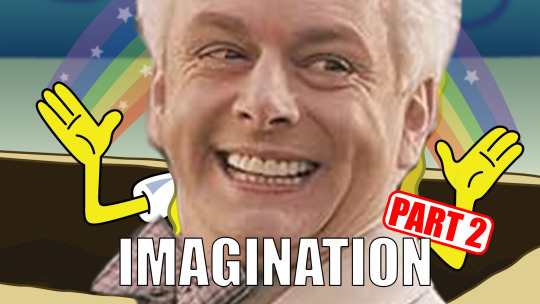
This is Part 2 of 3 total metas. Here are:
Part 1, in case you want to read about my analysis of the Story of Job first
and Part 3, in case you're impatient and want to jump ahead.
Fair warning though, for the sake of understanding some of the references, you're probably better off reading this chaptered meta chronologically. However, every part should work just as well as a standalone! I'll do my very best to make it so.
Alright, off or on you go beyond the cutty cut!
I'll start this second part off with a very brief summary of the main take aways and points from Part 1, which go as such:
Memory, as opposed to a third party's narration, is not a factual, objective retelling of a story or event. It's mingled and mangled with emotions, imaginations and exaggerations, projecting both the feelings and impressions you had back then as well as those you might have now in the present time back on whatever it is you are remembering. (Which is why we need to put everything that Aziraphale is remembering into the context of what he might have felt in the past, as well as what he's feeling right now.)
While this doesn't mean his (or anyone's) memories are lies, it does mean they're a very subjective and sometimes factually distorted representation of what actually happened, which, in our case, gives us a lot of subtext and a lot of not-there furniture to figure out and look at.
So, let's continue with S2E3 and the Story of wee Morag. We start our flashback with a scene of Aziraphale writing his diary entry on the 10th of November, 1827. Immediately, it's firmly established that this is once again not an outside-point-of-view narration, but rather what Aziraphale remembers and wrote down.
One thing that immediately stuck out to me here, is how helpful and kind Crowley is to Elspeth, pretty much from the very beginning when they meet her in the graveyard. Not only does he take on a Scottish accent so she won't perceive him as English (as she does with Aziraphale), but he also helps her drag the barrel that has the fresh body in it and, in the end, even pulls it all by himself while Elspeth simply follows behind them. Here's a rather poor-quality picture, for reference:
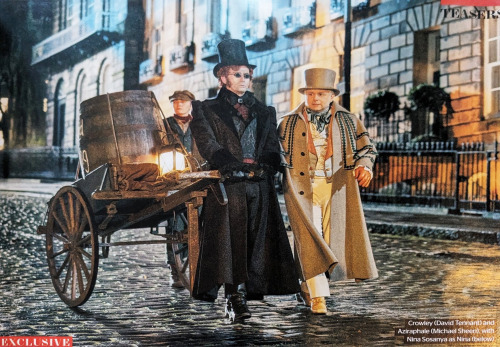
Now, we know that despite not showing it very often, Crowley has always been very fond of the humans and never really put himself on a pedestal simply because he's an immortal being himself. He likes humans, just like Aziraphale does. But, just like this story will tell us, Crowley knows that on top of liking humans, you can't just put them into boxes of good and evil and expect them to always do what is supposedly the "right" or "divinely good" thing to do. (Which is what differentiates him from Aziraphale in the way he understands and treats them, as we're shown in this minisode).
Him immediately and unspokenly helping Elspeth with dragging the barrel therefore might also be a first sign of a tiny projection from present day Aziraphale, as opposed to what Crowley might have actually done (probably just walked beside her, like Aziraphale) because he has the knowledge that Crowley really was so very kind to her in the end, wasn't he? And that he's kind to humans in general. ("Not kind! Off my head on Laudanum!" Sure, babe.)
Most of this minisode, in my opinion, is actually there to establish how Aziraphale's view of morality and good vs. evil used to be quite flawed and elitist –– and how Crowley has always been there to gently nudge him towards questioning his black and white view of heavenly right and hellishly wrong. That's why I think there's not as many hints in this minisode about Aziraphale's memories not being an accurate portrayal of what happened, as there are in the Story of Job or the magic show in 1941. (And, fear not, the latter will definitely be the most hint-heavy one). Alas, there's still a few bits and bobs in the Story of wee Morag that stuck out to me, that make a brief yet good case of the whole unreliable narration thing.
First of all: The way Aziraphale describes all of it in his diary is so different from the way we see him actually remembering it. It's almost like he tried to write this entry (and possibly all of his diary) as a bit of a thrilling short story, with himself as the main character. Which makes sense, given the fact that he adores books and would certainly be keen on dabbling in the art of capital-w Writing himself. It's yet again hinting at the fact that sometimes people (and angels) try to polish and bedazzle stories (and memories) to make them seem more exciting and adventurous, often to distract from the not-so-fun parts of it.
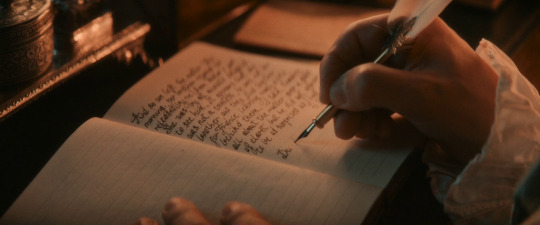
Like when Aziraphale's diary narrates:
"It was with heavy heart we arrived at Elspeth's destination. I was determined to thwart her monstrous plan!"
... and yet we see Crowley and Elspeth casually walking down the alleyway, very obviously not heavy-hearted in the slightest, while Aziraphale nervously scurries on behind them, very obviously not determined to thwart. (Timestamp-wise, it's around 17:38 in S2E3, in case you want to see for yourself.)
We get another cinematographic/auditory hint at the fact that Aziraphale's memory is heavily influenced by what he's feeling that very moment, when Dr. Mister Dalrymple –– FRCSE, thank you very much –– shows him the tumor he removed from the seven year old boy. You can see the shock and horror on Aziraphale's face once he learns of this child's cruel fate. We then proceed to hear Mr. Dalrymple's voice grow sort of echo-y and far away as the sad music swells up and drowns out his voice almost completely. It's awfully similar to what it feels like when really horrible news are broken to you and you dissociate and drift into a state of shock. Here's the clip of it, so you may listen for yourself:
It's clear that this is a very subjective portrayal of what Aziraphale is going through during this part of the memory. He's deeply horrified and saddened about the little boy having passed away so early in life – and we hear and feel this shock with him. Through him, because this is his memory. Whatever it is he's feeling and thinking, we're feeling and thinking it too because we're seeing it through his lense.
Another (less sad) hint at a possible exaggeration is the abnormally deep hole Crowley makes the two graveyard watch keepers fall into. I'm pretty sure he's very much in charge of his miracles, making this random slip-up seem a little silly – which is why I'm also pretty sure the "Might have slightly overdone it on that hole" is a wee bit of a meta hint at this just being another one of Aziraphale's dramatic bedazzlements of this story. For the *flings feather boa around neck* drama!
You know what else might be exaggerated? Hm, I dunno, maybe Crowley growing into the size of a tree for no apparent reason. Sure, yes, he's pretty high on Laudanum which is making him a bit loopy. But apart from that, it does seem an awfully big cinematographic euphemism for him being the metaphorical (and, once again, for the drama of it) literal bigger person in this scenario. He's the one who ends up saving Elspeth and who manages to secure a safe life without poverty and grave robbing for her. While Aziraphale was so tangled up in his own moral journey and main character-ism, missing that wee Morag was seconds away from death already, Crowley is the one who actually ends up growing stepping up for the human in need and saving them for good (pun intended).
In a way, it might just be Aziraphale's view of/feelings for Crowley in this very moment. Watching the demon outgrow what, according to Aziraphale's heavenly logic, is supposed to be a foul fiend, bestowing evil upon humanity – and growing into someone who does the exact opposite and saves Elspeth instead. Another larger-than-life character development, in Aziraphale's eyes. Literally.
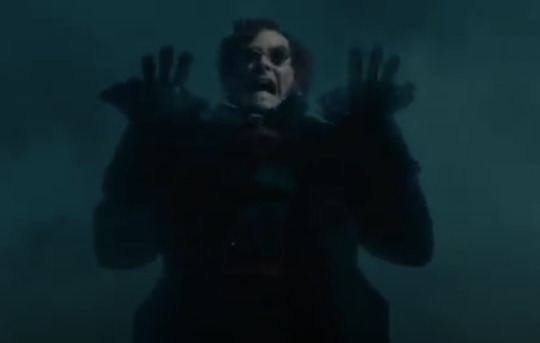
Let's switch back to the topic of the diary entry one last time, so I can make my final point of the this minisode's unreliable and a smidge over-dramatic narration of Dr. McFell. If you pay close attention, Aziraphale starts the entry we're all getting to experience with: "Last month, Crowley and I both happened to be in Edinburgh." Which means it didn't actually happen on the 10th of November, but rather at some point in October, 1827. Once we see Crowley get hydro-pumped back to Hell after rescuing Elspeth, the minisode ends with, presumably, the last sentence of Aziraphale's diary entry: "And that was the last I would see of Crowley for quite some time."
Take my hand and let's look at where the furniture isn't: This very clearly means that Crowley couldn't have been gone for more than a month, at best. Read again: "It happened last month and that was the last I would see of him for quite some time." This, albeit indirectly, clearly implies that when Aziraphale had sat down to write the diary entry, he had already run into Crowley again. Otherwise his phrasing would have probably been more along the lines of "... and I haven't seen Crowley since" or "... and Crowley has yet to return from wherever it is Hell's currently keeping him".
What's the point I'm trying to make? Good question. I guess my main point of storyteller Aziraphale being a bit over-dramatic in his narration is simply backed up by this, since A Single Month would barely pass as "quite some time" for an immortal being like him. And yet that's how he puts it, in his little Confidential Journals of A.Z. Fell, Vol. 603.
And another point that has absolutely nothing to do with the topic of this meta (but I'm still gonna make it 'cause this is my memory post): The meeting at St. Jame's Park in 1862 that so many, post-S2, took to be their first run-in after the Story of wee Morag, actually wasn't that at all. They saw each other at least once only a month later, as Aziraphale's diary lets us know. Which explains why he wasn't very surprised or concerned when he met Crowley in London, 1862. If there really had been 35 years in between those two events, the first one ending with Crowley being sucked back Downstairs to receive more than three decades worth of hellish punishment, wouldn't Aziraphale have been at least a tiny bit worried or more interested than:
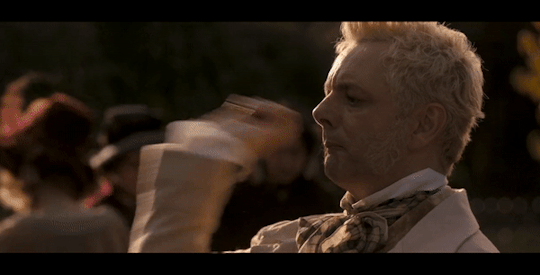
Just saying.
Alright, let's string this inflated hot air balloon of a post back together so we can outline some invisible furniture. This time with only two humble points:
Crowley through Aziraphale's lense
Backed up by how we are introduced to Bildad the Shuhite in the Job minisode (suave, cheeky, smart, passionate in shoemaking and obstetrics), it's growing quite clear that Aziraphale's memories and impressions of Crowley are very fond and impressed ones. He sees him as someone who's not only witty, funny and cool, but also as someone who has figured out way sooner and faster than him that nothing's ever black and white. Not God's plans and not the human's choices either.
Aziraphale as a bit of an exaggerating adventure author
With the direct parallel we get of inkslinger journalist!Aziraphale in the present day, it's quite apparent after this minisode that Aziraphale's memory is not only deeply influenced by his emotions, but that he also tends to have a bit of a dramatic touch to him. Although, you gotta give it to the guy: A month without seeing the love of your life, even if said life is eternal, can indeed seem like "quite some time".
Well, would you lookie here, we've reached the end of Part 2! What a journey it was. I hope you forgive me for the fact that I drifted off-course a few times. I just can't seem to reel in my silly little observations, even if they've got nothing to do with the point I'm trying to make. But hey, doesn't that just make me a little bit like Aziraphale's storytelling, in a way?
I'll let you be the judge of that.
See you in Part 3! And in case you haven't snuck a peak yet: here's Part 1 again.
Ta!
#good omens#good omens season 2#gos2#go2#good omens 2#good omens meta#ineffable husbands#aziraphale#crowley#good omens analysis#aziraphale is a storyteller#but not a very accurate one#story of wee morag#my own meta#aziraphale the Drama Queen#shakespeare who#unreliable but beloved story teller aziraphale
556 notes
·
View notes
Text
Unpopular opinion, probably.
So I've read many metas, and thought a lot about it and have come to my own personal conclusion about the final 15.
I'm taking it at face value.
Because it was the most human Crowley and Aziraphale have probably ever been and I think that is at least part of the point. Love makes people stupid and they are navigating a very human thing in very unhuman circumstances, and it's hard enough to do as a human in human circumstances!
I think Aziraphale believed the Metatron about Crowley bc he was expecting the worst when TM mentioned Crowley but instead got the one thing he wanted most (him and Crowley together and safe, not Crowley being an angel. ) Crowley was absolutely the carrot here. (and no I do not think Crowley would have been safe or happy, but that's besides the point.) I can't tell you how many times I've believed patently ridiculous things because I wanted to believe them so badly even though if I was looking at the same situation objectively from an outside POV I would see how ridiculous it was, so I totally get it. This isn't to say I think Azi had a real choice to go to Heaven or not and I think he did understand that as well, but I get the temptation the Metatron threw out to him, I really do.
As for Aziraphale literally saying all the wrong things to try and get Crowley to come with him? Um yeah been there done that too, the nerves take over, the brain shuts off, the mouth goes into autopilot pulling stuff out its ass, and "WITAF did I just say?" happens.
Crowley not taking any of it well and only hearing what he expected to hear (I'm not good enough for you bc I'm a demon and you only really want me if I can be an angel) *and* also being more able to see through heavens bullshit bc he has lived it, and can see it from the outside, *and* all whilst being the most honest and vulnerable he has ever been with Aziraphale in 6,000 plus years (or in fact possibly to anyone, ever. the closest before this admitting he was lonely to Azi during the Job minisode,) *then* hearing what he took to be the same Heaven will save us line from Azi was enough to trigger a massive bout of RSD and a broken heart. Everything was supposed to "vavoom and sorted! " and instead the stupid awning broke and everything went wrong. I think I've said it before that at this point Crowley can't hear anything over the sound of his heart breaking into a million pieces.
That's a whole lot to pack into the brief moments before Azi has to leave with the Metatron (who let's be honest was rushing him before he could change his mind) esp when neither of them are used to discussing their relationship openly. They didn't have time to think, to ask questions, to share information, (like hey guess what really happened to Gabriel?) Crowley tried to communicate as much as he could about his feelings with the kiss but Azi didn't have the time to properly process all that and said the wrong thing again and Crowley was rejected (he thought) again and it all just went so very wrong. You can't fix a 6,000 year relationship in 15 minutes, you just can't no matter what the story books say.
It's about two people wanting the same thing but not being able to get it (yet) because of circumstances and personalities. All of S2 was about them seeming to be closer than ever (and in many ways they were) but really they were opposed at almost every turn. (in RL not the minisodes, those actually showed them working together and coming out okay mostly, if you don't count wee Morag or Crowley getting dragged to hell) The way they both handled the Gabriel situation, how they both worked to solve the mystery, even how they tried to make Nina and Maggie fall in love were all either done alone, or in opposite ways. I've said it before and I'll say it again, as it was pointed out right in ep1, their exactlies aren't the same and until they are, they aren't going to be able to be together. The one time they did work together in the season, they produced a 25 lazuri miracle. That is the point of the final 15, and the whole season 2 in my opinion.
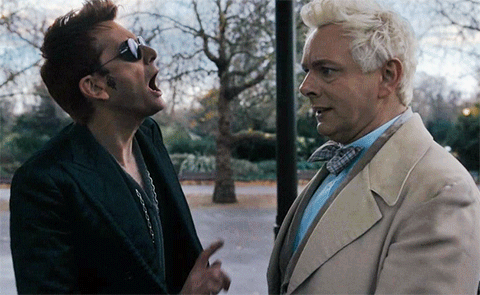
They'll get there in the end though!
#aziracrow#aziraphale loves crowley#crowley loves aziraphale#crowphale#good omens#aziraphale#crowley#ineffable husbands#aziraphale x crowley#aziraphale good omens#crowley x aziraphale#neil gaiman#anthony j crowley#crowley good omens#gomens#good omens 2#az fell#ineffable spouses#final 15#final fifteen#good omens meta#the final fifteen#aziracrow good omens
435 notes
·
View notes
Text
pt XVI good omens season 2 (still not traumatic) episode 3 EDINBURGH
HELLO IT'S ME IT'S THE OFFICIAL GOOD OMENS MASCOT WHY DO I STILL KEEP INTRODUCING MYSELF IDK. If you don't know who I am, thank God and Satan for their mercy and flee. Also, the day after I post this, I'll be watching the last three episodes on livestream for the first time so. You know. I'm hyped on the energy of this being my last day not enveloped in tears. Take the summary:
Before the episode starts, someone asks why Crowley said in the last episode that Aziraphale couldn't fall because look at him, all angelic when Crowley looked the same as starmaker. I reply that "Crowley thinks he deserved it, he sees Azi as something beautiful and untouched while he probably sees himself as idk marked in some way so god kicked him down."
I am told that I am learning too fast to weaponise the narrative to induce angst. So then I say oh, I go too fast for you. Tears ensue.
The episode begins! Everyone shrieks about Edinburgh, David Tennant, how it is their favourite episode, and SCOTTISH CROWLEY.
We open with lesbians being gay, and then Muriel enters as Inspector Constable! They are very sweet and very determined to do their job right, and they are adopted by Crowley and Aziraphale just like Jim.
Crowley sits on Aziraphale's chair's arm. The maggots all swoon.
Fine, I also swooned.
Aziraphale gaslight-gatekeep-girlboss-mansplain-manipulate-manwhores his way into getting Crowley to give him the Bentley keys (BOUNDARIES. BOUNDARIES.).
WHAT PLENTY OF USE DO BOTH OF YOU GET OUT OF THE BOOKSHOP?
The really ineffable plan is whatever the fuck was happening in Aziraphale's brain when he somehow went from London to Edinburgh via Loch Ness (check the map) and then proceeded to disguise himself as a detective who pretends to be a journalist.
Crowley slays in sleeve garters and a cardigan keeping house in the bookshop meanwhile, does not sell books, instead cleans with Jimbriel and periodically yeets book stacks into corners when distracted.
Aziraphale reads his old diary entries about Crowley, a (6000+) 13 year old with a crush.
MINISODE MINISODE. They are in Edinburgh during the mid 1800s. Victorian outfits, check. Scottish Crowley, check. Capitalist Karen Aziraphale, che-wait what.
Huh. Well. There's a wee bit of body snatchin' going on, to sell to doctors for medical research because there aren't enough murderers, and to make enough money to survive.
Aziraphale channels his inner capitalist judgemental Karen and ruins that plan, come on Aziraphale you have religious trauma but you're better than this, and long story short, Wee Morag dies after Aziraphale realises his error, her friend Elspeth has to sell her corpse for pennies, and is about to commit suicide with laudanum. Azi, oh god. I'm glad you underwent character development at least.
NOW CROWLEY HERE SLAYS. I KNOW THIS IS AZIRAPHALE'S PERSPECTIVE AND IS BIASED. BUT WITH THIS POV, CROWLEY SLAYS.
He calmly educates Aziraphale about how his whole "the poor have more opportunities and you shouldn't give them money or they'll lose the virtue of poverty" is absolute bullshit, and he does this understanding Aziraphale's situation and not losing his temper.
The framing. The framing of the shot when they see Wee Morag and Elspeth sitting down on a step and explaining their situation. Aziraphale stands above, bustling with righteousness, and judges them. Crowley sits down. He sits down next to them, rather than taking the high ground. He meets them where they are and empathises. It is the fact that he is fallen and damned that makes him behave really divine and sorry I wrote a whole hymn on him have it I'll stop rambling just know I love him.
I think his amusement is a facade so hell won't think he's genuinely being good. I think he's morally grey and incredibly brave and kind.
When Elspeth is bouta kill herself with the laudanum, Crowley grabs it and drinks it himself, and grows tiny and then huge, absolutely high off his head. David Tennant takes the opportunity to travel Scotland from east to west in terms of accent variety.
He gives us the good message of NO DYIN'. NO MORE DYIN'. IT'S NOT ON. And then forces Aziraphale (who doesn't want to ruin her virtuous poverty) to give the girl all the guineas he has in his pocket, and tells her to go off and start a farm or something. BUT NOT JUST PRETENDY GOOD, BE PROPERLY GOOD.
He then gets pulled into hell. To be punished for this. Aziraphale is frightened and heartbroken for him, looking around desperately, and we find out that Crowley didn't meet him for a while after. And later he wanted holy water. To protect himself? He got punished by hell. For how long? The whole month in between the incident and the diary entry? There can't be anyone better at punishment and cruelty than hell.
Sorry I'm just screaming here.
Never mind fuck I started this summary really happy and bouncy and listening to a dance playlist. Dionysus by BTS and Italian pop is still playing and now I'm crying.
Is this the natural progression. Fuck I'm crying. Sorry guys something else happens with Aziraphale politely talking to a phone and Crowley smiling really beautifully while unsuccessfully trying to manipulate two lesbians into a relationship and something about a visit I don't care everyone's being morally dubious as usual and then lovely Scottish music outro I CAN'T FUCKING ELABORATE I'M SITTING HERE CRYING OVER CROWLEY.
right summary done, time to go sob, lmao i thought i wouldn't cry today over good omens HAHAHAHA still not traumatic eh HAHAHAHAHAHAHHAHAHAHAHAHAHA
#good omens mascot#good omens#good omens fandom#weirdly specific but ok#asmi#crowley#maggots#lgbtqia#aziraphale#neil gaiman#edinburgh#scotland minisode#victorian minisode#scottish crowley#david tennant#michael sheen#ineffable fandom#ineffable idiots#good ineffable omens#ineffable brainrot#good omens brainrot#CRYING OVER FICTIONAL CHARACTERS#AGAIN#YAY#anthony j crowley#starmaker#wee morag#elspeth and wee morag
423 notes
·
View notes
Text
Middle of the night GO thoughts after reflecting on a couple of comments that the 'you're being silly' scene is actually not just the adorable soft exchange I have been caught up in. I mean it is, but it also isn't.
And it got me thinking that the whole of season 2 is like this, almost the entire time we have two truths in play. The whole season is one of duality.
A few examples (there are many more woven throughout but just to illustrate the point):
Right off the bat, the opening scene, it's both ominous and hopeful. Aziraphale is restrained while angel Crowley full of abandon; one angel is aware of the danger of questioning, the other is naïve. Both are experiencing the same moment in rather different ways. It sets the tone of the season immediately and puts in motion this layered truth within the story.
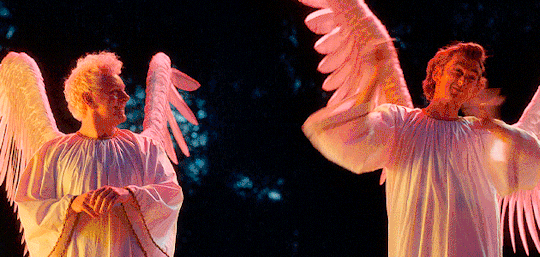
The minisode with wee Morag and Elspeth, the entire graverobbing premise presents us with the dual truth that digging up the dead is bad but the selling of the bodies to the surgeon, thus contributing to saving lives, is good.
Aziraphale grapples with the duality here, justifying the actions of Elspeth by convincing himself that one truth is greater than the other. We also see that Crowley is far more able to recognise the complexity of multiple truths being valid depending on circumstance. This whole minisode feels like Neil showing his hand a little bit, the duality is so explicitly addressed, meanwhile we, the audience, are engaged in a larger unfolding story in which we are observing similar layered truths playing out in different ways.
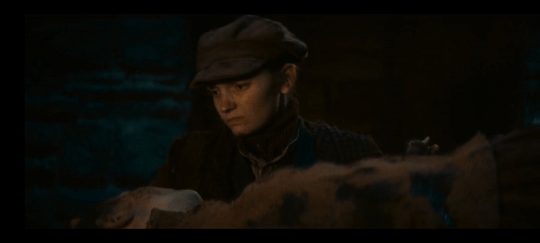
Now the scene that made this whole thought process unravel, still one of my favourite scenes and will remain so, is the "smitten, I believe...you're being silly" exchange. It is both tender and awful.
Here we have Crowley, expressing his very real fear of JimGabriel, opening up to Aziraphale that he doesn't feel safe in the bookshop because of the constant fear he will wake up, and Aziraphale just looks at him with heart eyes and tells him he's being silly. This flags so loudly that we're watching two characters who are experiencing very different versions of their current reality, due to past experience, yes, but also, Aziraphale and Crowley each have their own idea about the right way to react to the current situation.
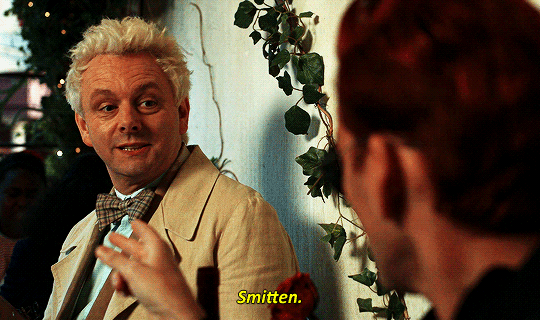
It's been pointed out by many before me, but the ball is another example of incredible juxtaposition and an extraordinary display of two truths existing at once. It is both incredibly romantic and an actual nightmare.
It is reflected, once again, in the way Aziraphale and Crowley are experiencing it, we know one character is caught up in the romance, the other in the horror show, but as a viewer, we are being tasked with holding both truths in our mind simultaneously. And both are true.
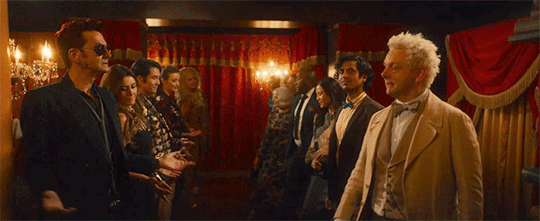
Aziraphale the entire season is both giddy in love and completely dismissive of Crowley. It is adorable and infuriating at the same time.
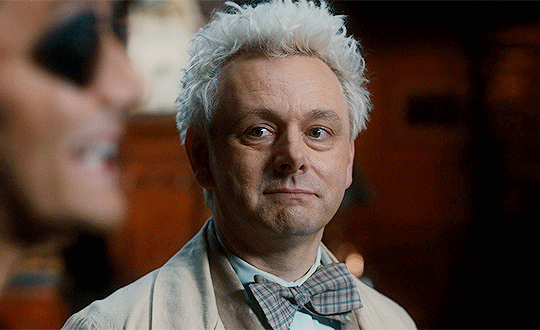
And yes, it is a reflection of the very duality the entire premise of Good Omens presents us with - that something can be good and bad at the same time, pure and corrupt, that the entire binary of Heaven and Hell/good and evil is flawed because those concepts can and do co-exist.
But the way it is seen in the interactions on a personal level this season is what has leapt out at me. It's why I think we see people falling into different interpretations of a lot of the scenes and moments, because they are more than that, they are observations. We are often observing two sides of the same coin, and both are true. The sheer genius of it and the way it is a mirror to the characters and the entire concept of the show we are observing is, quite frankly, mind boggling.
And it all comes to a head in the final fifteen™. There is so much duality in play here that it is no wonder there are hundreds of posts untangling bits of it and trying to extract the meaning from within the many layers. It's because we are given two truths in this final scene that are both heartbreaking.
Crowley loves Aziraphale and wants them to be together, free at last. Aziraphale loves Crowley and wants them to be together, free at last.
BUT
Aziraphale wants to use the system to keep them both safe. Crowley wants to escape the system to keep them both safe.
And then all the moments of duality between them throughout the season reach a critical juncture: Aziraphale in love but dismissive, Crowley understanding that Heaven = good is too simplistic and trying to compel Aziraphale to remember the lesson from Edinburgh ("when Heaven ends life here on Earth, it'll be just as dead as if Hell ended it"), Crowley trying to use the notion of romance to counter the nightmare with a desperate kiss.
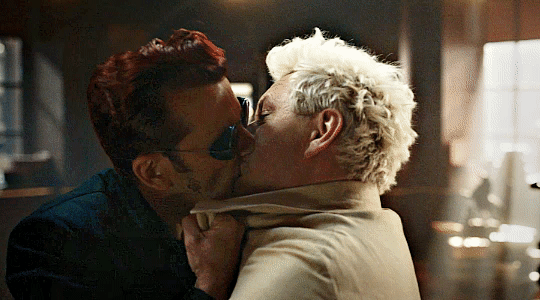
It's a complete inversion of those two truths in the opening scene of the season, the entire scene is at the same time ominous and hopeful, but it is Aziraphale who largely being naïve and Crowley who is aware of the danger.
I mean, it was all spelled out for us really, this duality and the fact that those multiple truths in play were always going to come to a head. It was all there, wrapped up in this quote:
"What does your exactly mean, exactly? I feel like your exactly and my exactly are different exactlies".
#good omens#good omens meta#aziraphale#crowley#aziracrow#honestly don't know if this even makes sense#middle of the night thoughts and all that#good omens thoughts
977 notes
·
View notes
Text
You Say Potato, I Say Excellent! Or blocking, accents and legacy of morality tales in ‘The Resurrectionists’ minisode PART II
Alternate title: how Aziraphale’s naivety in this episode was supposed to make you a bit outraged
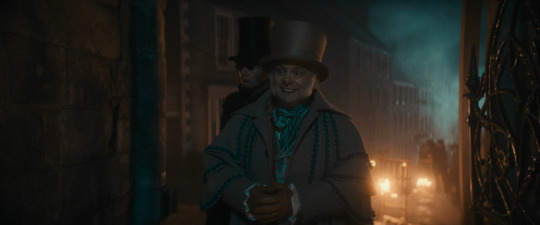
I have to shout out to @bowtiepastabitch for their AMAZING historical analysis of this minisode - it prompted me to finish this long ramble that has been drifting in my notes. Anyway, I have a major obsession with the ways blocking and dialogue interplay in Good Omens - you can check out my analysis of the blocking in the flashbacks in S1. But The Resurrectionists is really something special. This got so long I am splitting it into two parts.
What we see in this minisode is a morality tale - a genre of children’s literature that was extremely popular in the early 1800s where the minisode is taking place. Catch up on the historical background in Part I.
When looking at this minisode, it is really important to look at two complementary narrative tools - Crowley’s accent and the placement of Aziraphale in relation to Crowley. Through the minisode, Crowley switches between his standard English accent and a delightful Scottish accent. But the switching isn’t random!
Scottish lines = character Demon Crowley, who moves the plot of the story along
English lines = Crowley, the moral guide leading Aziraphale
Additionally, the two of them swap sides in their blocking frequently in this episode. Their standard placement is A/R + C/L but the swap to C/R + A/L is almost the norm in this minisode.
Analyzing Blocking and Dialogue
We open in the graveyard, with Aziraphale and Crowley in their standard placement, observing the statue of Gabriel. But then they notice Elspeth, digging up a corpse. When Aziraphale approaches Elspeth to inform her that her actions are Not Good, he actually ends up swapped with Crowley and finds himself on the left because what he is doing - making moral judgments on the actions of Elspeth with no understanding of what led her here - is doing Good, not good.
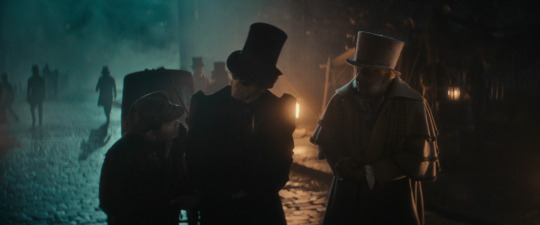
The next scene finds Crowley helping Elspeth cart the corpse away from the graveyard, while the trio debate all the other ways Elspeth could make money - Aziraphale suggests running a bookshop, farming, weaving, giving the standard Good party line about hard work blah blah blah. Aziraphale remains on the left - after all, those supposed options are completely unrealistic, unobtainable professions for someone in Elspeth's socioeconomic position. They aren't remotely helpful suggestions.
Aziraphale only finds himself back on the right when he and Crowley are introduced to Wee Morag, and have some time to listen and observe the reality of their situation.
Then, off we go to complete our journey to sell the body. Aziraphale and Crowley find themselves having a debate about morality, but Aziraphale is again ON THE LEFT as he waxes poetic about the virtues of poverty - doing Good, not good again. What I loved here was you saw the clear purpose between Crowley’s two accents as he switched mid-line -

Crowley: (SC) Oh, I'm down with wicked! (EN) Anyway, is it wicked? She needed the money.
Upon reaching the lodging of Mr. Dalrymple, FRCSE, Crowley and Aziraphale take their standard places but this scene has one really important moment that I want to highlight. When they open the barrel to find the rotted corpse, the look on Crowley’s face is so telling. He often finds Aziraphale’s machinations amusing even when they are annoying, but here he looks decidedly disappointed. Aziraphale might have done Good by rendering the body unsellable, but what good did it do? The body is still been un-interred. Elspeth has wasted her energy, and has made a terrible first impression of the surgeon whom she needs to pay her for her services. It looks like Crowley wants to say something, but he stops himself and clenches his jaw. The PATIENCE he is showing to Aziraphale - this is a quality that Crowley has in SPADES but we really see him exercise it here.
After the discussion with Mr. Dalrymple, in which Aziraphale realizes the importance of dissections for educating medical students and thus leading to better care for the living, he asks the right question - why should the poor have to risk death to obtain bodies? But he let's himself get sidetracked by a blatant appeal to his emotions...
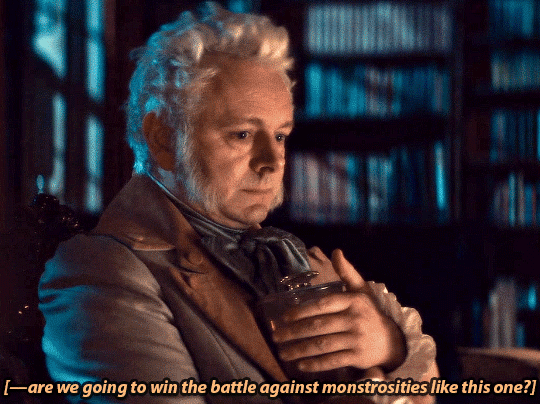
At this point, Aziraphale goes all in on body snatching being Good. Which... it still isn't because it is based on a broken system that disadvantages the poor? FOCUS, angel. He even goes as far as to offer to help Elspeth and Wee Morag in obtaining another corpse but note that again, he is on the LEFT -
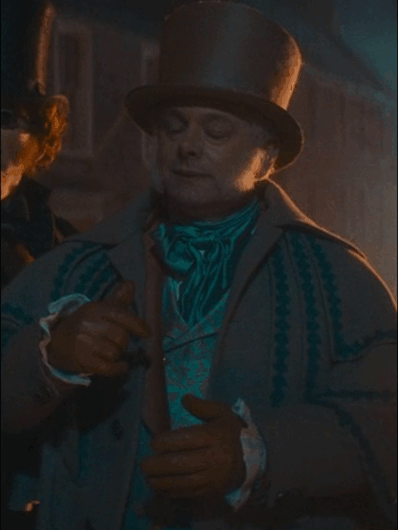
Remember, Wee Morag is deeply conflicted about the morality of body snatching, and instead of explaining anything to her (like, that having your body dissected won't keep you out of heaven would be start) Aziraphale just sort of joins Elspeth in pressuring her to join in - which is pretty awful and coercive, but gee if that isn't just heaven's playbook for doing Good, not good.
So we return to the graveyard, and this is where everything goes sideways. Aziraphale spends basically this entire sequence on the left. First, he notices the ingenuity of the grave guns but fails to acknowledge the travesty of so much energy being spent on protecting wealthy corpses while the poor suffer. Then, the tragedy strikes. After Wee Morag is shot, Aziraphale wastes time justifying saving her, resulting in her dying before he can act. And after all this, after the heart break of seeing her partner die, we see Elspeth come to the logical conclusion. If body snatching is Good, then might as well take Wee Morag off to Mr. Dalrymple, right?
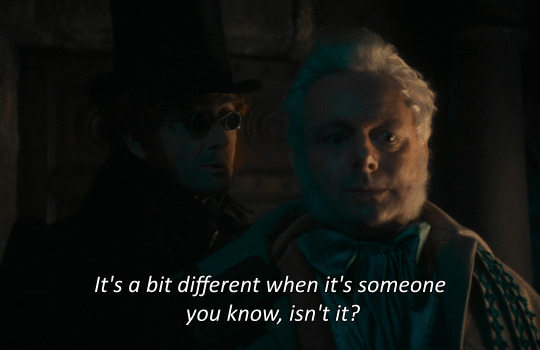
What shouldn't be overlooked is what takes place when Elspeth gets Wee Morag's body to Mr. Dalrymple. Because while Aziraphale is very clearly illustrating the dangers of black and white morality through religion, Dalrymple is showing that black and white morality through science is just as bad. Dalrymple has unshakable belief in the power of science and knowledge to alleviate human suffering and sees his work at Good. He cares about preventing illness, but ignore his role in perpetuating poverty - an unfortunate side effect of rigid belief systems of all shapes and sizes. He is downright cruel to Elspeth.

This is already getting real long, so we won't go into the absurdist comedy of the scene in the tomb - suffice to say that the surreal nature of Crowley's bargaining with Elspeth smacks of a fantastic tales of pacts made with the devil. It's delightfully unhinged.

The one line I think worth pointing out?
"Do I sound like a goat?"

I think this line is key in the narrative connection between the three minisodes in S2. All three flashbacks show Crowley and Aziraphale engaging in acts of deception, but they all have important differences:
In A Companion to Owls, the two work together, and they manage to pull off the trick and evade punishment.
In Nazi Zombies from Hell, Aziraphale comes up with a plan and Crowley goes along with it, and they barely manage to evade punishment.
In The Resurrectionists, Crowley comes up with a plan and Aziraphale goes along with it, and Crowley is sucked down to hell.
I think it's worth noting just how silly Crowley is in the first two minisodes. Bildad and Scottish Crowley are FUN even when dealing real heavy shit. Just a complete joy to watch. And we never see that level of silly from him again. Whatever happened in hell was clearly really bad since the next time we see him in St. James Park he is asking for holy water. He may have moments, but he is never the same.
Questions, comments, additional thoughts? Lay them on me. I'd love to dig into new lines of inquiry on this minisode because I just love it so much <3
#good omens#good omens meta#the resurrectionists#just theatre kid things#history is my jam#look the blocking has me feeling things#shades of gray
256 notes
·
View notes
Text
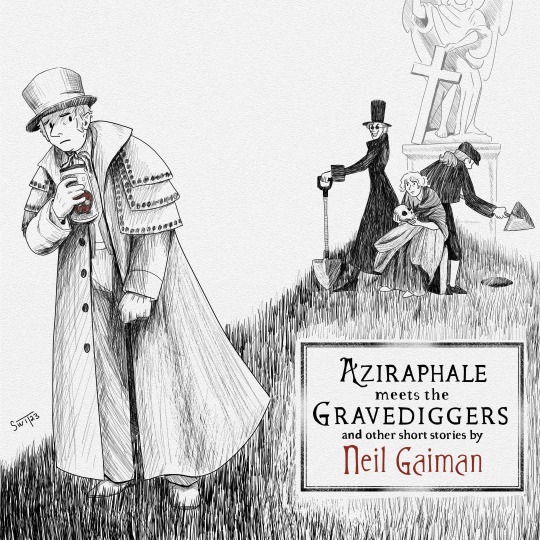
The Resurrectionists minisode reminded me of an album cover, so of course I had to create something so niche, that most people won't probably understand what it's referencing
It's based on the album called "Mary Ann Meets the Gravediggers and Other Short Stories by Regina Spector" (2006) by.... well, Regina Spektor (album cover below).
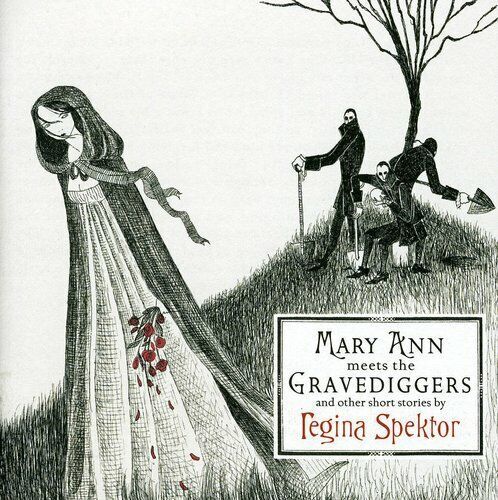
It was fun coming up with details for it, like Wee Morag being the one holding a skull, Gabriel's statue in the back and Aziraphale holding the tumour, symbolising his conflicted feelings (I also love giving Crowley his shit-eating grin, good stuff).
(NOTE: Neil Gaiman did not write "The Resurrectionists" minisode, it was Cat Clarke. I found out that after writing the text. The text part isn't 100% accurate anyways)
261 notes
·
View notes
Text
Stocktaking in the Basement
Aziraphale's Edinburgh Journey: Part 3
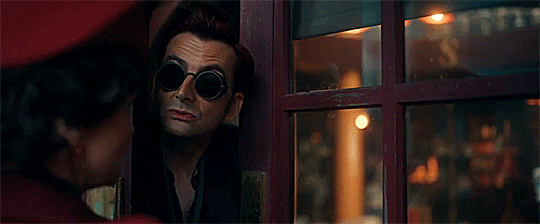
Usually one would think of going through their memories as a learning experience as more of a "rummaging around in the attic" metaphor, since the brain, the keeper of memories, is in the highest part of our bodies. But one of S2's underlying themes is the looming Second Coming and the resurrection of the dead, so its underground that we need to head - to the basement.
Aziraphale does a great deal of "stocktaking in the basement" during his trip to Edinburgh. He recalls the encounter with the body-snatcher Elspeth and her companion wee Morag in 1827 on the way up, has his memory jolted by the statue of Gabriel to something more recent, then thinks about what happened in 1941 on the way back. We are largely going to deal with aspects of the 1827 minisode in this meta, and some possible implications for S3.
Lets have a look at why this year, 1827, was chosen for this minisode. The Anatomy Act of 1832 gave doctors and medical students legal permission to use donated bodies for research and educational purposes, and was made so to stop the distressing trade of body snatching that was occurring at the time. But this minisode isn't necessarily about stopping that activity, rather the reasons for doing it in the first place. Looking at Strong's Concordance, as we must, in the Greek, 1827 gives us "convince" or "prove to be in the wrong." This sounds about right for this minisode, which includes the conversation about poverty inducing more opportunities to be wicked, which somehow leads to holiness, from the book. The minisode shows how Aziraphale has this idea turned around for him - he's convinced otherwise, and shown how his initial beliefs about the practice turn out to be wrong.
Also, around 1827 is the time when the building of private mausoleums was at its peak. A mausoleum was (and still is) a display of wealth, so featuring one here plays into the story in the minisode of the virtues of poverty versus the rich. (It's also a call back to the origin of the Bentley's number plate, which was written on a mausoleum in a Monty Python sketch.)
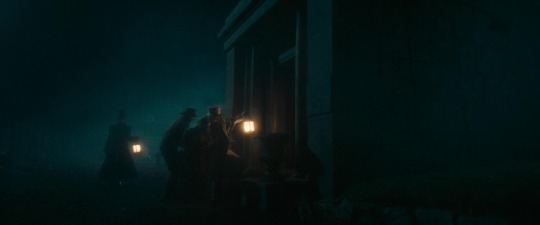
Digging Up the Past
Shax does her own stocktaking when she receives the above push-back from Crowley, and realizes that Aziraphale is not in the bookshop at all at that moment, and goes looking for him. Later, she digs up his own dirty past to taunt him with, in an effort to make him crack and give up Gabriel.
But why is Aziraphale digging up this particular memory at this time? We know he is fond of Edinburgh and has visited many times, so this particular memory must contain something of importance for us to see.
There is the title of the minisode, some Masonic symbology and the metaphorical act of the snatched bodies as the dead rising from their graves which all point us in the direction of the Second Coming and Judgement Day, which we will cover in Part 4, so we'll put that to the side for the moment.
Changing Sides
Let's have a look at some of the blocking of the scenes in the Resurrectionists minisode. This wont cover everything, so if you do go back to have another look at it yourself, do pay close attention to who stands where.
When we first meet Crowley and Aziraphale in 1827, they are standing on what we think of as their "normal" sides, angel on the right and demon on the left. Elspeth, caught in the act of body snatching, is even further to the left, the real demon on the scene, which actually pushes Crowley back to the middle ground.
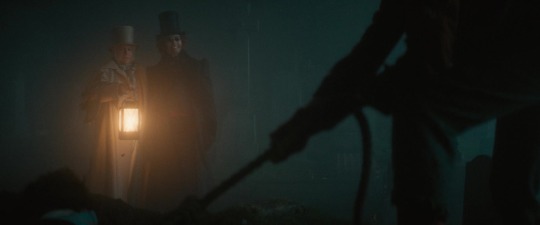
Straight afterwards, we see all three of them walking together through the streets of Edinburgh. Crowley is still in the middle, but now Elspeth is in the angel's position and Aziraphale on the far left as a demon, as they all discuss the virtues of poverty. Oh dear, Aziraphale, you're losing the argument here, and losing badly!

Inside Mr Dalrymple's rooms, Aziraphale decides to take matters into his own hands, where he thinks he is doing the right thing, and miracles the first body into soup. Elspeth is caught innocently in the middle of this, and Dalrymple is on the demonic left.

A conversation is had with Dalrymple following this. Crowley is hidden in the right-hand chair, Aziraphale, who needs to be swayed, is in the middle, and Dalrymple is still on the demonic left.
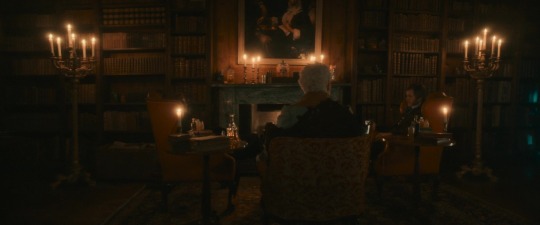
After heading back to the cemetery for another body, Crowley and Aziraphale inspect some of the protective measures set up to guard the graves. Crowley is still on the moral right, questioning if the rich are more worthy of being protected from body snatchers than the poor.

Despite changing his mind about body snatching, Aziraphale still ends up on the wrong side of the argument in the end. As a giant Crowley looks down on the two of them, its Aziraphale standing on the demonic left side as the virtues of poverty lose out once more.

Timely Lessons
Back to the fireside chat with Dalrymple. We have this heartfelt reaction from Aziraphale when he learns the preserved specimen he is holding came from a seven-year-old boy.
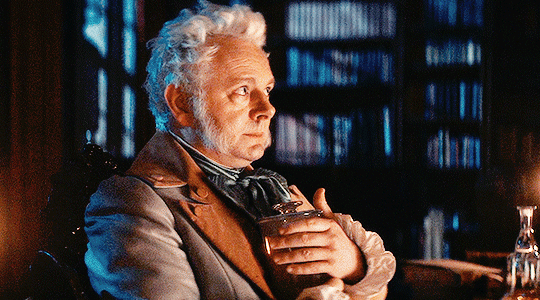
AZIRAPHALE: [takes the jar] Well, that's a foot. So it's definitely not a foot. [laughs]
DALRYMPLE: That's my point. If you two smart gentlemen can't identify it, then what are my students to make of it? I removed this tumor from a seven-year-old boy.
AZIRAPHALE: Oh. Oh dear. And… Is he…?
DALRYMPLE: [shakes head] And that is why we need a steady supply of cadavers. We need to cut. If we can't cut, we can't learn. If we can't learn more, a lot more, then how on earth are we going to win the battle against monstrosities like this one? I'm just trying to save lives and teach students. I either end up with a knighthood or condemned as a resurrectionist and hanging from a rope.
This, I feel, is an important lesson for them, and it seems for Aziraphale in particular. Why? This part focuses more on his reaction to the tumor, rather than Crowley's, and when we focus on Aziraphale it has ramifications for the future.*
A physical problem is usually easily identified (such as the foot). But what if the problem is invisible, because its on the inside? How do you see into a body, find a problem and make it visible, if you have not been presented with this problem before? Or perhaps you know something is wrong, but don't know what to call it?
It doesn't even have to be physical, it can be a mental, or a psychological problem. One still has to learn how to "see" the problem, to identify what it is (such as a particular pattern of behaviour) and to know the best course of action to overcome it.
Crowley wishing for more murderers to facilitate Dalrymple's research is one thing, but not being able to save a 7 year-old boy...this is the theme of the death of innocent children we've seen repeated throughout the series (the Flood, Job's children, the aborted attempt on Adam, the Crucifixion, and the implications around Crowley's Fall, to name a few.)
This also plays into the "representation matters" theme from the end - you can't be what you can't see.
This is not a lesson about the fact that they care, because they do, but how they learn to see the real problem in the first place.** I'll be interested to see the matching scenes/parallels to this in S3.
The Two Dalrymples
It has not gone unremarked that there is a Dalrymple mentioned in S1 as well - Witchfinder Colonel Dalrymple, who made the fancy Thundergun that was taken to Tadfield to shoot the antichrist with.

Now we can talk about the connection between the two Dalrymples - they are both about removing "monstrosities" from humanity.
Take the line in the passage above: "If we can't learn more, a lot more, then how on earth are we going to win the battle against monstrosities like this one?"
As I've mentioned before, the root of the word monster is from the Latin for monstrum, "a divine omen (of misfortune)," but also monstrare, which means "to point out," which bring us back to this scene in S1, on the tarmac of the Tadfield Airbase:

Aziraphale took Witchfinder Colonel Dalrymple's Thundergun to remove the monstrosity that was Adam the antichrist to save humanity, and Mr Dalrymple the surgeon is trying to learn how to remove and save humanity from the monstrosity we know as cancer. I'm just making a spot now on my S3 bingo card for a third Dalrymple mention, that will no doubt have some connection to the removal of monsters and/or monstrosities from the world.
Balancing the Books
The final bit of stocktaking might just be the coldest part of the whole recall process.
When Aziraphale calls from the cemetery in Edinburgh, he mentions Dalrymple's fate to Crowley:
AZIRAPHALE: Oh, do you really think so? Um, Crowley… Do you remember Dr. Dalrymple, The one who bought, err…
CROWLEY: Wee Morag's body. Not a doctor… A mister, yes! Yes, whatever happened to him?
AZIRAPHALE: [reading pamphlet] He left Edinburgh in disgrace. And then he killed himself.
CROWLEY: Mmm.
Mmm, indeed. They might have saved Elspeth from Hell to meet up with wee Morag again, but the count of souls was still balanced out in the end, with Dalrymple heading the other way. The last time we see him he is still on the demonic LHS of the screen in blocking as he pays for wee Morag's body. Hell had him marked well in advance of his demise.
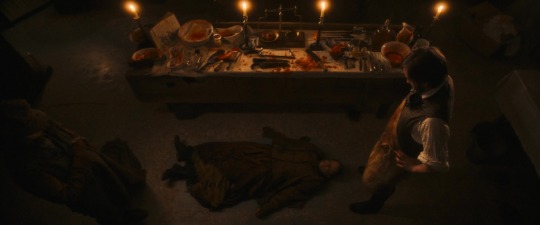
Time to move on to Part 4: Judgment Day, where we look at all the signs that the End Times are approaching. Again.
Thanks to @vidavalor for the thematic inspiration for this post.
For further reading:
You Say Potato, I Say Excellent! Or blocking, accents and legacy of morality tales in ‘The Resurrectionists’ minisode PART II by @pommedepersephone
The linked post at the beginning Historical Analysis: class and injustice in 'The Ressurrectionists' minisode by @bowtiepastabitch is here.
An intro to Elspeth and wee Morag being parallel characters to Aziraphale and Crowley by @good-soupmens I'm going to follow up on this in Part 5.
*I explained in Part 2 that I believe we are being shown the future through Aziraphale and his parallel characters, Beelzebub and Maggie. Another reason for this is that in S1 is that Anathema is one of his parallels, and she is also caught up with living in the future through the prophecies of Agnes Nutter. In contrast, Crowley's story, and that of his parallels, such as Gabriel and Newt, are about the past and trying to live the life you want that isn't bound by expectations. Urrgghh, I can see I might have to expand on this somewhere later.
**Crowley, with most of his story in the past, shows us an example of this with his "looking where the furniture isn't" comment.
The other posts in this series can be found here:
Part 1: Detective Aziraphale
Part 2: Aziraphale-Beelzebub Parallels
Part 4: Judgement Day
Part 5: I Know Where I'm Going
#good omens#good omens 2#good omens meta#aziraphale#mr dalrymple#witchfinder colonel dalrymple#elspeth and wee morag#good omens 1827#edinburgh 1827#the resurrectionists#scene blocking#body snatchers#strong's concordance
58 notes
·
View notes
Text
When I first watched Good Omens 2 I was surprised by the ending. I had been so focused the romance of the season. The Jane Austen, the witty retorts, the dancing, the secrets glancing. I took the bait and when the ending came I fell hook line and sinker. Much like Crowley I felt I had drove into a pot of boiling sulfur. But then looking back I realized if I had actually been following the story we were being told instead as of getting swept up in the romance, I would have realized it was never going to end happily.
The flashbacks are what really foretell the ending. They aren’t just fun romps through history. They serve a purpose. And the purpose is to set up and elaborate upon how Crowely and Aziraphale see the world and each other, and how they see heaven, hell and earth. And what these flashbacks prove is they have huge gaps between the ways they see the world that need to be bridged. Those gaps could have been crossed ages ago but as the flashbacks show multiple times- Crowley and Aziraphale don’t communicate well and that leads to disaster. It will destroy them if they don’t sort it out- I mean their ability to communicate is so lacking that it literally ends with Crowley pointing a gun in Aziraphale’s face and shooting it. And he gets in this pickle because he loves him! Which is pretty twisted! And if the gun wasn’t dangerous enough their friendship them almost gets revealed to hell by zombies- grossly incompetent zombies at that! If Aziraphale hadn’t managed to pull off that magic trick- which easily could have happened. He’s very bad at magic. Who knows what horrible things would have happened to the both of them.
This miscommunication gap also hurts the people around them. If Crowley had explained the why Elspeth was graverobbing to Aziraphale instead of letting him watch and figure out for himself maybe things wouldn’t have gone so far and Wee Morag wouldn’t have ended up dead. Or at least Aziraphale and Crowley could have found away to help Wee Morag that didn’t involved inspiring displays of well… Scottishness? while being drunk on laudanum that end up with Crowley getting sent to hell and tortured (tortured to the point that some people have pointed out that when Crowley gets he asks for holy water for insurance- which is just plain sad and awful, and leads to even more conflict between Aziraphale and Crowley. Or if Aziraphale hadn’t felt the need to plan an entire ball just to dance with Crowley- cause let’s be honesty that’s really why he did it- maybe all of his guests wouldn’t have ended up in danger.
I remember upon watching the episode with the graveyard and Scottish Crowley- being dismayed with how behind ideologically Aziraphale was compared to Crowley. I knew he would do a huge amount of growing in the two centuries to follow. But part of me had filled in the blanks and assumed he would be farther along in that journey by the 1800s. I remember wondering how he was going to catch up in between then and the present day. When I watched the finale episode I realized he hasn’t caught up. He hasn’t quite made the leap away from heaven. He might think he has and Crowley might even be starting to think that too. He even had us as an audience beginning to think he had let go of that baggage But Aziraphale’s problem is he wants to do good . He wants to save the world and heaven with it. he can’t quite give up the ghost- he is too self sacrificial. He’s going to need to learn that he, like many kids of abusive parents- can’t fix the situation he came from. Not without sacrificing himself. He’s going to have to stop running and confront his baggage to truly be free of it. And Crowley on the other hand needs to realize he can’t just run from his past. He needs to reckon with his time as both angel and demon. He needs to grieve what was taken from him instead of just living in opposition to it. Because Crowley’s problem is he too wants to save the world. He just wants to do it in his own (and maybe with Aziraphale, but mostly on his own). He too is way too self sacrificial to the point that he sacrifices himself and his sense of self time and time again all in the name of his own side. His side may be the only truly good one between heaven and hell. But he is only one entity. He has to learn to open up again. To truly open up. Which is why it’s so frustrating that when he finally opens up to Aziraphale in episode 6, things go wrong! But as frustrating as it is, it sets an amazing stage. It gives Aziraphale the chance to build up Crowley’s trust. To build up Crowley’s faith in them as team. So that when Crowley opens his heart again it’s done on his own terms and in a way that is healing. Poor Crowley has been though so much, and he has been through so much of it alone. People can affirm themselves and their path’s in life only so much with out needing some support from others. Notice how Crowley is still living in his car. He never asked if he could move into Aziraphale’s bookshop. He sees himself as a burden, as not good enough for the angelic Aziraphale that he so admires. He probably thinks he would weigh him down. Crowley needs affirmation to heal. He needs to be loved and not loved in a way that’s cloaked with shame, but loved in a way that is able to sit with self comfortable. But Aziraphale is not at the point where he can give that love yet. When that happens he can help Crowley heal from his abandonment by heaven. He’s been picking up after heaven’s mistakes since before his fall. It’s time for someone to take care of him in return. Because as much as Crowley says his actions have nothing to do with heaven or hell, he does still feel burdened by their weight. Now he can’t do this journey just with Aziraphale. He needs to do some of it on his own. Bu he needs love to heal- we all do. So does Aziraphale. They can give each other that. But they have to be ready to. They have to do the work they need to do on themselves to get to that point.
228 notes
·
View notes
Text
The Eldritch Ball or Aziraphale's Macabre Danse
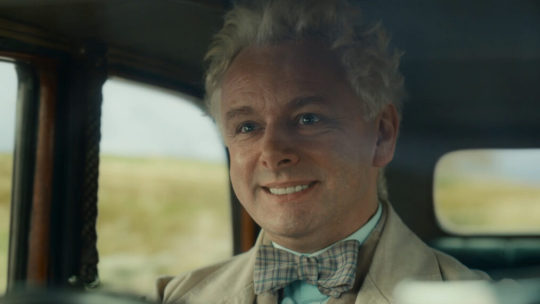
I'm a huge sucker for dark classical music (I'm using the term "classical" broadly, not referring to the specific period. Music-y folks, please forgive.) As such, Saint-Saëns's "Danse Macabre" is one of my all time favorite pieces. It's spooky. It's intentionally dissonant. It's even got a jump scare! Like, literally, the perfect piece of music.
youtube
The story behind "Danse Macabre" goes like this: Each Halloween at midnight, Death enters the graveyard with a fiddle. As he plays, the skeletons rise from the ground and dance through the cemetery, resurrected by Death's power and possessed by his instrument.

In S2 E3, the Bentley plays "Danse Macabre" as Aziraphale drives up to Edinburgh. "What do we do? We play classical music that stays classical music." (And the Bentley listens to him! Because the Bentley is an expression of Crowley's subconscious and wants to please him and make him happy...and I'm sure you can find lots of excellent metas to that end. Or maybe you have another theory about why the Bentley is so pliant toward the angel? I'd love to hear it. But that's not what I'm talking about right now. I'm just getting distracted.)
Why is this song so perfect for a bit of subtle foreshadowing and repeated metaphor? So glad you asked. I have reasons. And evidence. Please, peruse my wares.
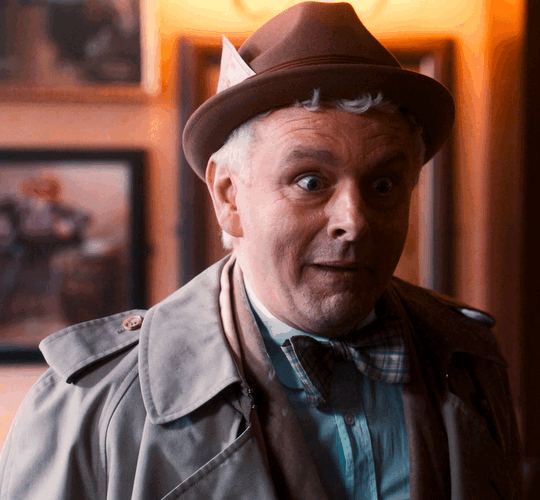
In the A Plot of this episode, Aziraphale travels to Scotland to visit a pub called The Resurrectionist. (Ya know, like Death? Like how Death resurrects people in the song? Okay, just wanted to really hit that nail into the coffin.) The pub is, of course, named for a certain Mr. (not Dr., he's a surgeon) Dalrymple, whom Crowley and Aziraphale meet in the accompanying flashback minisode entitled (you'll never guess) "The Resurrectionist." The minisode plot involves Crowley and his the angel encountering young Elspeth, a grave robber who, like Death, releases the bodies of the deceased from their earthly bonds of soil and stone. My interpretation is that Elspeth becomes Death incarnate, first in the process of using her instrument (her shovel) to resurrect the dead, and later when she inadvertently brings about the literal death of her partner, Wee Morag. Rather than allow Wee Morag's body to turn to dust in the ground, Elspeth "resurrects" her, selling her body to Dr. Dalrymple (sorry, Mr. Dalrymple, he's a surgeon, not a doctor), who will use Wee Morag's body for research, which will in turn save the lives of countless others by furthering the field of medicine. A form of resurrection, indeed. There's also the plot thread of Crowley and Aziraphale providing Elspeth with a nest egg to escape the cycle of poverty into which she has been born. This, too, is another form of re-birth. Or, say it with me, resurrection. Alright, you're getting it now.
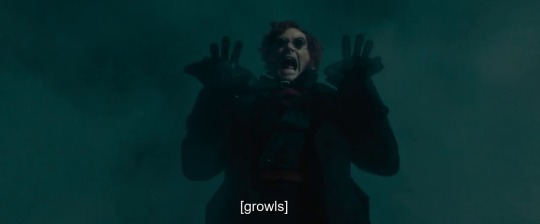
Okay, now I get to delve into the fun stuff. Let's talk about that cotillion ball, shall we? You know, that danse party where Aziraphale persuades all the shopkeepers on Whickber street to attend a Jane Austen-style ball?
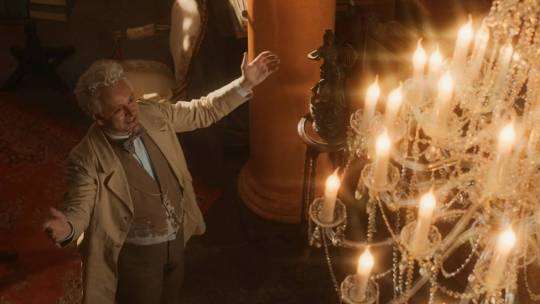
I personally refer to this whole fiasco experience as the Eldritch Ball. On the surface, it seems fairly innocent. The shopkeepers need a little bit of encouragement to attend the Whickber Street monthly meeting, but the angel manages to convince everyone to join with the help of some coercion-via-bribery. When they show up, they're transmuted into Austen-esque characters, from their clothes, to their speech patterns, even to some extent, their perception of reality. This is where it starts to get a little uncomfortable if you peel back the layers. Mrs. Sandwich can't talk about what she does for a living, which is a great comedy bit, but also demonstrates that her speech is being significantly censored and altered by an outside force. With the exception of Mr. Brown (hidden agendas here, Neil? I honestly don't know), all the shopkeepers find themselves in new, slightly-period-appropriate garments. What's really weird, though, is that no one notices the changes. When the dancing begins, to the music of Mr. Anderson's piano and an accompanying string quartet (strings...as in violins...as in fiddles. Remember Death's fiddle?), Nina appears to be the only one who realizes that something is off.
Maggie: This is something new.
Nina: This is something completely bonkers. Are we...? Why is everyone talking like they've escaped from Pride and Prejudice?
Maggie: Just getting into the spirit of things, I suppose.
Nina: The spirit of what things? This is meant to be the shopkeeper association monthly meeting.
Maggie: Hmm. Yes. Now that you put it like that...
Nina: Are we dancing?
Maggie: Yes.
Nina: Did you ever learn the steps to this dance?
Maggie: It's just what we do, isn't it?
Nina: No. No, it isn't. This is something mad. This is their [Crowley & Azirapahle's] fault. They're doing this.
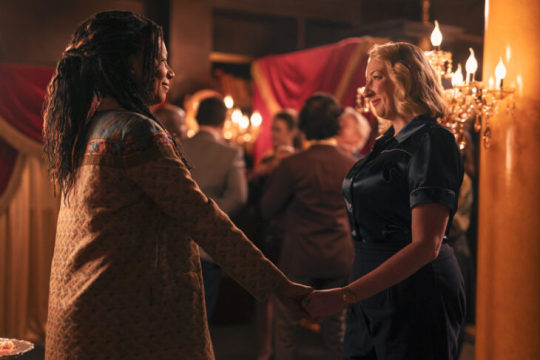
Something is definitely mad. One might even say it's macabre. Aziraphale has become Death the Resurrectionist. He has lured the shopkeepers of Whickber Street through a portal (as Death leads his flock from the world of the dead to the world of the living.) Aziraphale's instrument is his clipboard and pen, held almost as one might hold a fiddle and bow, as he invites the various shopkeepers to the monthly meeting. Once they all arrive, he miraculously gives them new clothes (as Death knits together the bones of the dead), and then proceeds to control their bodies and minds, as though they are merely marionettes. They dance and speak in the way Aziraphale imagines, fulfilling his fantasy of a perfect Jane Austen-style ball (quite literally, the Danse Macabre.)
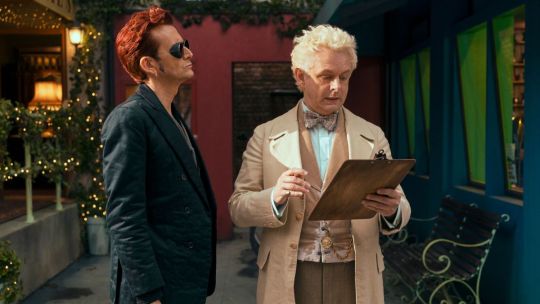
The shopkeepers have become the dead and Aziraphale controls them until the spell is broken--or rather until the window is broken.
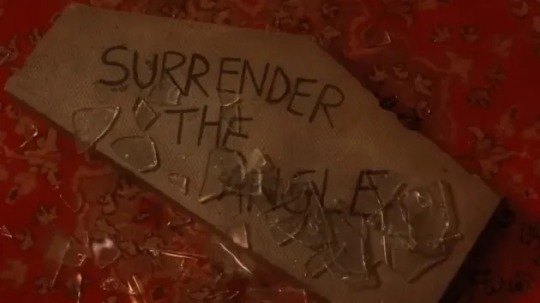
To be honest, I don't think Aziraphale is really aware of how much he is able to transfigure his environment, including the humans who happen to be close by. Or, at least, I don't believe he does any of this with ill intent. He's just a bit blind to anything outside his fixation of wooing Crowley, at the moment. As a result, he creates a situation that is profoundly problematic and unnatural. Just like the dead in the graveyard have no agency when Death plays his fiddle, the Whickber Street shopkeepers are possessed by Aziraphale's intricate romantic fantasy and must dance as long as the music plays.
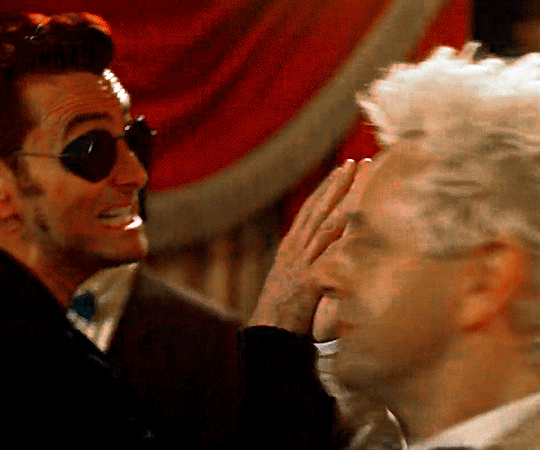
It is, in fact, only when the music stops, that the shopkeepers begin to realize that something is most certainly weird. The diagetic music (Mr. Anderson & Co.) abruptly cuts off when an approaching demon horde tosses a brick through the bookshop window. Now the spell, or in this case, miracle, begins to break down. While the shopkeepers still appear to be somewhat under the influence of Aziraphale's persuasive aura, a few of them glance down at their clothes in confusion and look around the bookshop, as though waking from a dream. And at this point, after a little finagling, Crowley escorts the humans out of the bookshop and out of Aziraphale's Danse Macabre.
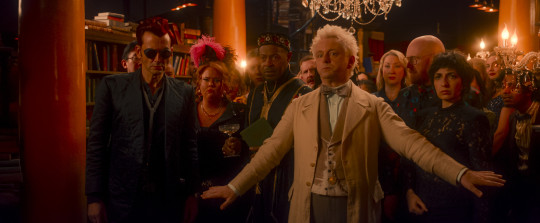
Once the demons attack the bookshop Aziraphale's influence on his surroundings really starts to deteriorate. Throughout the season, he's been able to structure and manipulate reality (sometimes with Crowley's help) to suit his needs: protecting Gabriel, altering the Bentley, organizing the Ball, etc. But once the bookshop, his safe space, has been breached, he loses control of the situation. From this point in the narrative, nothing goes according to Aziraphale's plan. Aziraphale wants to protect Jimbriel, but the former archangel insists on giving himself over to the demons. Crowley leaves and Aziraphale has to defend the bookshop on his own, when he'd expected Crowley to come right back and save him. While defending the bookshop, Aziraphale reaches his "last" resort not once, but twice: first allowing Nina and Maggie to use his books (!!!) as weapons and then blowing up his halo in a last ditch effort to fend off the invaders. This was not on the agenda for today!
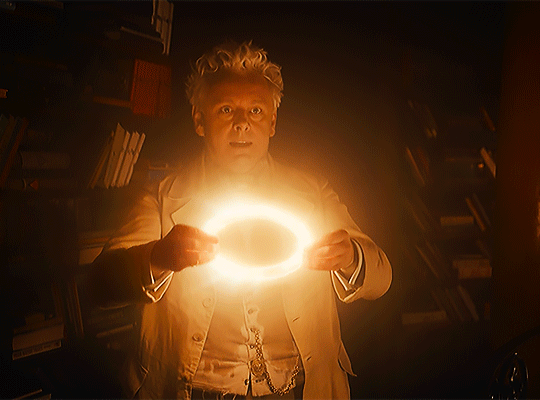
Things just continue to go downhill from there, Aziraphale losing all control of the situation. And by the time the Final Fifteen wraps up, the angel has lost his bookshop and possibly his most important relationship. By the end of the season, Aziraphale is no longer Death the Resurrectionist, the manipulator and puppeteer. Now the angel has become the puppet, dancing to Heaven's music.
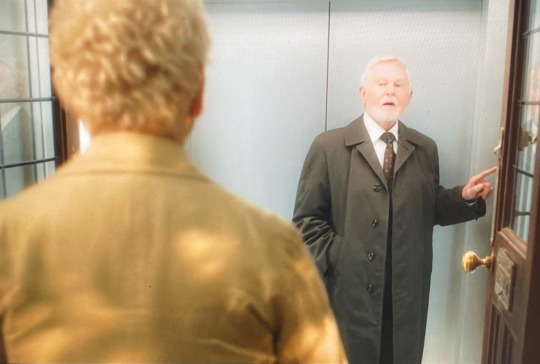
#good omens#aziraphale#aziracrow#crowley#go metas#good omens meta#danse macabre#camille saint saëns#the bentley#nina and maggie#eldritch ball#elspeth#wee morag#dark music#Youtube
107 notes
·
View notes
Text
There were a few moments in s2 that made me gasp or tear up. All of them involved Crowley. ❤️
'LET THERE BE LIGHT' and the delight on Crowley's face when he looked on his creation. The sheer excitement and joy and curiosity he exudes, and his well intentioned decision to ask some questions of 'upstairs.' Just the pure heartedness of him. Not a cynical bone in his body, not even the self-preservation instinct that Aziraphale has (when he counsels him to leave well enough alone). To think that he went from this to the jaded demon he is later, it just breaks my heart.
When he saves Job's children. Oh my heart.
The bit where he prevents wee Morag from committing suicide and then assumes hell hasn't noticed because, if they had, he'd be down there already -- and then HE GETS SUCKED DOWN AND PUNISHED. And all we know is that Aziraphale didn't see him for a long time. WHAT DID THEY DO TO HIM? My poor baby.
The bit where he's in Heaven with Muriel, wearing his awful outfit, and Muriel can't open the file on Gabriel because it's above their pay grade, but he can, and he just says - 'I wasn't always a demon.' The power and competence he still has at his fingertips despite all he's lost. Oh Crowley. Oh my. *Fans self.* #competence kink
The Regency dancing. Fuck me, they actually danced.
His protesting that Aziraphale could never be anyone's 'bit on the side' because he's too pure of heart. Meanwhile HE'S the one who's pure of heart, defending his angel's honour. Crowley, my hero.
The part where the angels don't recognize the Metatron but Crowley does because, despite his demon status, he's the most in tune with the divine, the purest of heart, not blinded by the bureaucracy or politics of it. This, regardless of what you may think of the Metatron.
Pretty much the last quarter of episode 6. His TIDYING UP THE BOOKSHOP and then anxiously waiting. Planning for 'us time' afterwards. His courage in deciding to lay his feelings bare. The SPEECH. The desperate kiss. Putting on his glasses to hide his eyes again. And then waiting and watching by the Bentley until Aziraphale takes the final step into the elevator.
I am dying here. That said, I think this was the right way for Neil to go in terms of narrative arc if we are to have a season 3. You need the angst and the tension to create momentum, which adds depth to the story. If they had tied everything up in a happy little bow, the story would have been diminished. There just had better be a season 3.
#good omens#go s2 spoilers#good omens season two spoilers#Crowley my heart#good omens meta#Crowley my hero
205 notes
·
View notes
Text
INEFFABLE META MASTERPOST
Because I'm slowly losing count and need to organize. So, here's all my self-written metas or ones that I reblogged with my own added theories and commentary! In rainbow colours, naturally.
1 – Aziraphale, I love you. But you lied. And here's why.
My most lengthy and proudest meta about the Final Fifteen and why I think Aziraphale lied on purpose. (Also: The absolute darling @esthermitchell-author bravely fought their way through it and wrote up some more interesting points and different takes on what I came up with. If you want to go down a S2 rabbit hole with us, go read it here.)
2 – Why Aziraphale is an unreliable narrator (links below)
A three-part meta in which I try to analyse and explain that all of the minisodes in Season 2 are not objective narrations but actually Aziraphale's memories.
Part 1: The Story of Job
Part 2: The Story of wee Morag
Part 3: The Story of the Magic Show in 1941
3 – The Jane Austen Ball and why it was never about Nina and Maggie
A meta in which I go into unnecessarily great detail about how the Whickber Street Meeting Cotillion Ball was meant to be Aziraphale's confession to Crowley.
4 – Crowley & Aziraphale were never free (reblog)
A reblog of @baggvinshield's post in which I explain why miscommunication is the single biggest ineffable enemy in Season 2.
5 – In Defense of Aziraphale (double reblog)
A double try at explaining why I think Aziraphale's POV in the Final Fifteen is just as horrible as Crowley's and why I don't think him "choosing" to go back to Heaven was the only point of his character journey.
6 – The Art of Miscommunication: Ineffable Edition
A meta in which i once again explain why miscommunication is the single biggest ineffable enemy in Season 2.
7– Season 2 Bookshop Shot Meta
A meta where I briefly loose my mind because of a single bookshop frame in Season 2.
8 – What if it wasn't Aziraphale and Crowley who performed the 25 Lazarii miracle?
A mini-meta in which I propose the theory that Jimbriel helped with the miracle to hide himself away from Heaven & Hell.
9 – Things in Good Omens Season 2 I still find weird (reblog)
A reblog of @ok-sims and many other great OPs' thoughts on the weird loose strings in Season 2 and what unanswered questions I still have myself.
10 – The Deleted Bookshop Scene (reblog)
A reblog of @skirtdyke's video and @i-only-ever-asked-questions' smart thoughts on it, with my own overly-excited 'what that could have meant for the "It's too late" line'-theroy.
11 – The Bentley Handle Easter Egg
A meta I can proudly say has been liked by none other than Mr. Neil Gaiman himself about Crowley's Bentley handle that might have existed before the Bentley ever did.
12 – The F*cking Eccles Cakes
A meta where I briefly loose my mind because of a pastry. (Addendum: People said very smart things in the comments of the post!)
14 – Re: "You go too fast for me, Crowley"
A meta in which I make myself sad by connecting that infamous line to Aziraphale assuming Crowley wanted the Holy Water as a suicide pill.
13 – Trauma-Dumping on your plants: The Anthony J. Crowley Chronicles
A meta on why Crowley treats his plants the way that he does.
14 – Demonic Mental Health Awareness Post
In which I talk about why I want to get Crowley a therapy voucher.
15 – The Curious Incident of The Flaming Sword in Good Omens
A meta on why the Flaming Sword has no deeper meaning. Or does it? (Updated: here's a reblog from @queerfables who did a wonderfully exellent job at calmly explaining all the swordy questions I was yelling about! Consider this meta solved.)
16 – Ceci n'est pas une plume
A meta in which I'm a bit of a nerd for language and also explain why learning French and magic the human way says so much about Aziraphale as a character.
17 – The meaning of "I forgive you"
A meta in which I explain what both "I forgive you"s mean and why Aziraphale will always fight for what is right until he wins. Also, the lovely @sharksbeerr translated it to Chinese on Weibo!
18 – Memory, or the lack thereof, in Season 2
A little reblog on how memory is a big and unresolved, leaky-bucket theme in Season 2.
Addendum:
The one non-spoiler-y ask I could come up with about S2 that was actually answered by Neil, yay!
Also, this wholesome little post I added to that Mr. Gaiman also reblogged. :‘)
*** This is a work in progress and will get updated every time I post a new meta! ***
#good omens#good omens season 2#crowley#aziraphale#ineffable husbands#gos2#go2#good omens 2#good omens meta#good omens s2#my own meta#good omens season 1#meta masterpost#ineffable-suffering
507 notes
·
View notes
Text
Bizarre Good Omens Theories without Context or Explanations
📌 I'll update this as we all go on
1. Crowley and Lucifer are twins
2. God's favourite is Crowley
3. Michael is an evil angel with a hidden agenda
4. The handle that started the engine is the only thing that can make make the star factory stop
5. The handle is a piece of a bigger mechanism outside time and space in the Good Omens AU
6. Satan was jealous of the human creations so he collects and tortures them to spite God
7. God and the Devil are playing chess and/or cards at the Alpha Centauri
8. Aziraphale is a bet between God and the Devil
9. Crowley have had it but he won't be able to leave Muriel on their own
10. God cradled Crowley on her lap
11. Aziraphale urged Judas to betray Christ as part of the big plan because Judas just couldn't really. 📌
12. Elspeth and Wee Morag's relationship is also parallel to that of Aziraphale and Crowley (Elspeth means, "chosen by God" and Morag means star of the sea/great) use this info how you want 📌
13. Crowley and Aziraphale switching sides indicates from whose memory/narrative that part of the story is being told. 📌
14. The sentence, "I forgive you," is what Crowley would have wanted to hear from God. Not getting abandoned. Not sauntering vaguely downwards. 📌
What would you add to this?
#good omens theory#aziracrow#crowley#good omens#ineffable husbands#ineffable idiots#ineffable lovers#crowley aziraphale#good omens season 3#ineffable bureaucracy#crowly x aziraphale
85 notes
·
View notes
Text

It doesn't matter. It's too late. It's always too late.
That line haunts me. And it's so present all over this season.
It's too late to salvage the ball before it even starts. It's too late to keep Aziraphale out of harm's way. It's too late for Wee Morag
All the way back to the start, before everything, before time, before the beginning, it's too late for the Angel of the Stars who just wanted to ask a few questions.
And ofcourse, after all that time, when one of them finally works up the courage to actually say what they are, what they could be, it's too late
Good Omens is a story about beings beyond time, and yet there is a time, and it is always too late.
#neil gaiman#david tennant#good omens#michael sheen#crowley#aziraphale#innefable husbands#it's too late
54 notes
·
View notes
Note
Hello! Would you like a chocolate chip cookie? And if you have an opinion on it can you share why you think that Aziraphale never calls Crowley by his first name when it's really romantic? Thank you!
Thank you for the cookie and the ask. *noms* They're both delicious.
Aziraphale explained in 1941 in what situations he'd be willing to deviate from his normal, fond use of "Crowley" and give Crowley's (very romantic-- Aziraphale loved it) first name a go:


To get used to something is to grow accustomed to it. That's the surface layer of Aziraphale's response to Crowley in 1941 but the innuendo is that he's telling Crowley he's willing to "get used to" Crowley's new first name-- meaning, that Aziraphale is willing to call Crowley "Anthony" in bed.
It's also a bit more romantic a line if you factor in some of the etymology of 'use'/'used' as well as look at how Aziraphale's use of it also connects to wordplay with several other words (brook and bad) and in other scenes in the series (1827 and 2008) as well. More on that under the cut.
Used: from the Latin usus (yes, 2x us-- cute, huh? ) and the Old French us (the French just kinda decided one 'us' was enough to describe what 'us' is, apparently.) It developed from there, predominantly through Old French, into user and the concept of to use. So, long story short, the idea of using something is derived from the concept of 'us' as being a group of more than one person, which adds a bit more of a sense of romance to using the word 'use' in a sexually euphemistic sort of way (at least it does in the context of 'use' being used by two word nerds lol).
To use: original meanings, many of which are still, well, used... to frequent, to practice, to make use of, to enjoy, to apply, to consume. The word replaced the Old English verb brucan in this way. Brucan meant to brook something, which is an old-fashioned way of meaning all of these: to eat with someone; to use; to possess; to endure (to last); to cohabit with; to need; to enjoy.
We heard Aziraphale throw 'brook' into a sentence to Crowley in S2 in 1827, still thinking he had enough time to be flirting with Crowley while discussing the morally right position to take but Crowley felt Wee Morag dying in the process. Maybe not the most cheery example of Ineffable Husbands flirt but it ties linguistically to 'used' and shows a history of Aziraphale using the two words as innuendo:
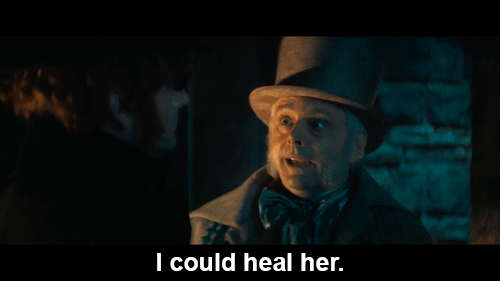
Used might seem on the surface to be a slightly vulgar way to refer to sex but its etymology, as we can see here, is more romantic and also ties to the food theme of Crowley and Aziraphale's language as well.
The words-within-words of Ineffable Husbands Speak is the first rule of it-- and also the (pardon the bird pun) cardinal rule of language in the show, in general. This is off of the first shot of the show being the word 'war' being shown to us as within the word 'warning'. The word that lives inside used is us.
Crowley is using (ha, unintentional pun, sorry) us/used as recently as in 2.06, even if Muriel has no idea what it means. Crowley doesn't trust that the Inspector Constable isn't going to report to Heaven what they see in the bookshop once they leave so he is actually speaking aloud an intention to take Aziraphale to boozy breakfast in an effort to hide the fact that he's actually thinks they're in massive trouble and need to work out a plan. Everything he's saying, though, as with a lot of what he says to Muriel in general, is in his and Aziraphale's language, mostly for Crowley's own amusement, so this bit below is as much Ineffable Husbands Speak as "extremely alcoholic breakfast at The Ritz" is:
"When Aziraphale does come back, I think we need a little us time."

Us Time = Muriel, that's when all house guests need to get gone because Antony and Cleopatra need to use the fuck out of each other...
...but going back to brook for a second?
We looked at brook as a verb, right? What it means to brook? But the common way we use the word brook now is in its other meaning as a noun-- a brook is a stream. It's a body of water and it houses fish. If you've seen any other post I've made about Ineffable Husbands Speak, you've probably seen that we can see that fish and everything nautical/the sea/ships/etc. is rooted in Aziraphale's oysters innuendo in Rome when they started sleeping together. They use references to fish as euphemistic for the sexual experience and, in particular, orgasm. The sea as sexual metaphor isn't exactly new (those "crashing waves" are in many a book lol) but Crowley & Aziraphale have turned basically anything related to the sea into sexual innuendo across several scenes.
If there's a pun to be had, Crowley & Aziraphale have found it, and one of the more amusing ones is a word where fish/the sea crosses into Heaven/Hell-related words-- and that's in damned. To be damned is to have been cast to Hell but within damned is the word dam. A dam is a natural or manmade barrier that exists to stop or redirect the movement of a body of water. As Ineffable Husbands Speak innuendo, being damned would then seem to be at least one of, if not both of the following: to be to be restrained in bed (something which several different scenes suggest Crowley periodically enjoys) and/or a reference to repeatedly stopping prior to an orgasm aka edging (also something which the language in several scenes suggest is an Ineffable Husbands favorite past time.) More than likely, it's probably the two combined.
From here, go to the innuendo that ends the 2008 minisode in 1.01, when Aziraphale says: "Well, I'll be damned" and Crowley replies, with a wink:
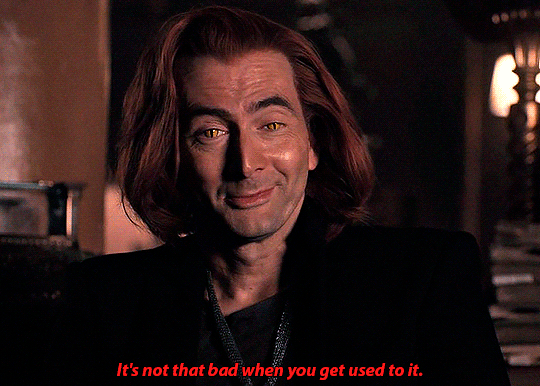
😂😉 Bonus etymology because it adds something to Crowley's above flirt:
Bad: From the Old German baeddel, which meant hermaphroditic, a word that's a bit outdated in our modern use of language but which is of historical relevance to being intersex and is rooted in the Greek god Hermaphroditus-- the intersex child of Hermes and Aphrodite, the goddess of erotic love. (It's Aphrodite who is the root of the word aphrodisiac and who was frequently depicted in art on the shell of a scallop or an oyster.)
Hermaphroditus was one of the Erotes, which were the ancient Greek gods of love and sex. When they're referred to in Roman art and literature, the Erotes are called "Cupids." In the 18th century, a French novelist popularized a rebranding of sort of Asmodeus as a Cupid-like figure and Crowley didn't exactly deny that he's Asmodeus when Aziraphale suggested so in the Golgotha scene. There is also the Cupid statue in the bookshop-- seen in the same scene in S1 where Crowley flirts with Aziraphale by using "bad" and "used." (It's visible in the earlier part of the scene, when Crowley is still drunk and walking around.) The Cupid sculpture is angled so that it is aiming its arrow at Aziraphale's desk. 💘
There is also that, in 'Demon's Guide to Angelic Beings Who Walk the Earth' (the book Furfur has in 1941), Furfur has written a note to remind himself not to trust Crowley because, among other reasons: "his hair is bad!" The joke is that Furfur doesn't know just how true that is (or see the irony because Furfur's hair is also a pompadour of sorts lol.) Crowley's hair is always in a variation on the pompadour-- an intersex hairstyle throughout history, worn by everyone from society ladies to Elvis. Crowley is bad, indeed, and it adds a bit of self-referential-ness to the "it's not so bad when you get used to it" wordplay that suggests Aziraphale's own history with being damned-- even though he's still an angel in 2008. 😉
#ineffable husbands#aziracrow#good omens#crowley#aziraphale#good omens 2#good omens meta#crowley x aziraphale#ineffable husbands speak#etymology
22 notes
·
View notes
Text
The Best Love Story
For, well, basically eternity, we’ve seen this dynamic:
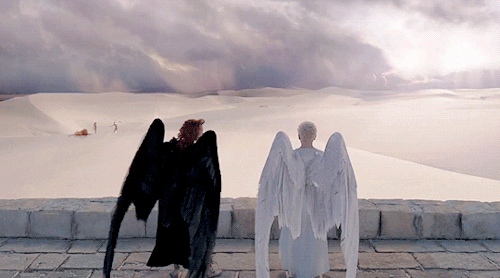
Aziraphale protecting Crowley. Even In the Beginning, our favorite Guardian Angel was showing us his nature - warning Crowley against questioning too much, afraid of the consequences. We go on to see Aziraphale do what he could to protect Crowley from heaven and hell throughout their time together.
In Crowley, we see a patient teacher. Since Eden, when Aziraphale confessed to giving away his flaming sword, Crowley found a potential kindred spirit- someone else who didn’t blindly obey and went by their own moral compass.
The gentle, and very kind and patient way that Crowley guides Aziraphale on his own path, in combination with the angel’s genuine caring for the demon, is the foundation of their friendship. Crowley gently points out things that go against the moral compass they seem to share - whether it be the flood, killing Job’s children, poverty, and the error of thinking in black and white.

Both sacrifice themselves to protect the other. Crowley saves Elspath because he knows her death would crush Aziraphale, who was already dealing with his responsibility over Wee Morag’s death. Hell took him, and Aziraphale didn’t see him again for a long time.
Aziraphale sacrifices his identity as an angel. He chooses Crowley over and over again. Saving Job’s children, giving him holy water, and leaving Earth.
Their relationship is based on caring, patience, kindness, sacrifice and above all else, love. I think that’s why it’s so powerful.

#good omens#ineffable husbands#aziraphale#crowley#some things do last forever#the best love story#book of love
35 notes
·
View notes
Text
The Small Back Room - Maggie's Record Shop (unhinged meta no one asked for, part 1)
I'm going to cover these in two separate posts because there are a lot. This post is going to be dedicated to the artists with multiple covers in Maggie's shop.
*This is all bonus content from The Arrival (2x1).
What is the purpose of the record shop? It's called The Small Back Room, and it's connected to Aziraphale's bookshop. And a small back room seems like a place someone would store their records.
"If I owned a record shop, I'd be more concerned about people breaking in and leaving more records behind." - Nina
And someone left more records behind. Records of "Every Day".
Aziraphale hears Gabriel sing a human song that Aziraphale is unfamiliar with, so he goes to the record shop to ask Maggie, who actually has way too many copies of "Every Day" because of a pub in Edinburgh, the place with the cemetery that has the statue of Gabriel.
There is more to it though. The pub called the Resurrectionist that plays "Every Day" over and over on the jukebox (and somewhere in America John Mulaney is cackling like a madman) now has direct ties with Aziraphale's personal life because they ended up in Maggie's record shop.
The place where they met Elspeth and Wee Morag, Mr. Dalrymple, messed with dead bodies, and where Crowley saved one woman's soul from Hell.
We heard one passage from Aziraphale's diary, and it was about the time he and Crowley went to Edinburgh that started off with them looking at the statue of Gabriel.
We know Aziraphale has more than 600 volumes of personal written history (as of 1827).
Where is he going to store records of his life on Earth? A record shop that no one other than him visits, attached to the building he owns.
The walls lined with record covers that are telling stories. Clues as to where the story is going to take us? Could they be Aziraphale's diaries or other important records Aziraphale has kept for thousands of years?
And is anyone else concerned about "Come on Over to Our Third Floor Apartment" or is that just me? Heaven is the third floor when you look at the button arrangements on the lift. ⬆️⬆️ ⬇️⬇️
Oslo Revival
1. Come on Over to Our Third Floor Apartment (We're Having a Party / Just for You / Four in a Bed / Have This Drink / It Doesn't Taste Weird / We'll Take Care of You / We Love You / You're One of Us Now / Together Forever)
2. Disguises (Carol and Her Hat / The Bicycle / Memories of a Windchime / Lunch / Who Am I Today? / Make Me Cry / Peggy Asked for Her Jumper Back)
3. It's Raining in My Kitchen (You Cast a Spell on My Wife / Running into Danger / Transcending the Patriarchy / Plumbing / A Dozen Eggs, (Too Many) / Someone New in the Bedroom)
4. Better Together
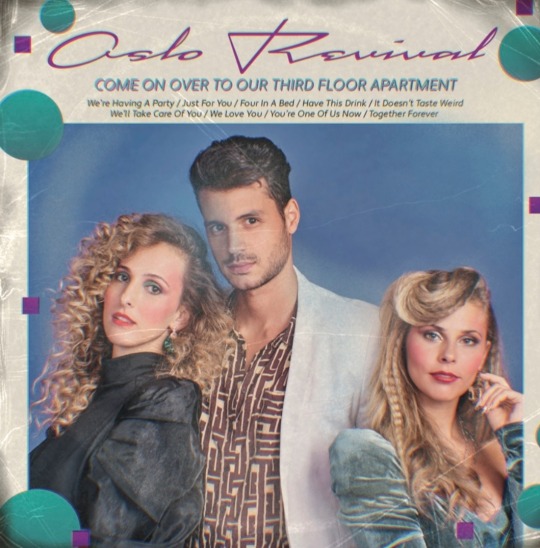
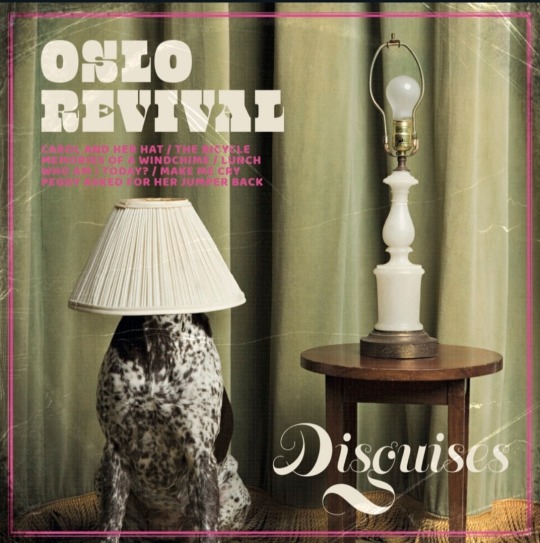
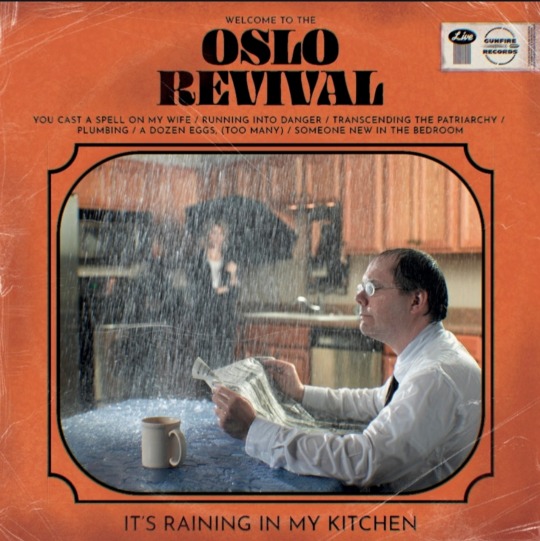
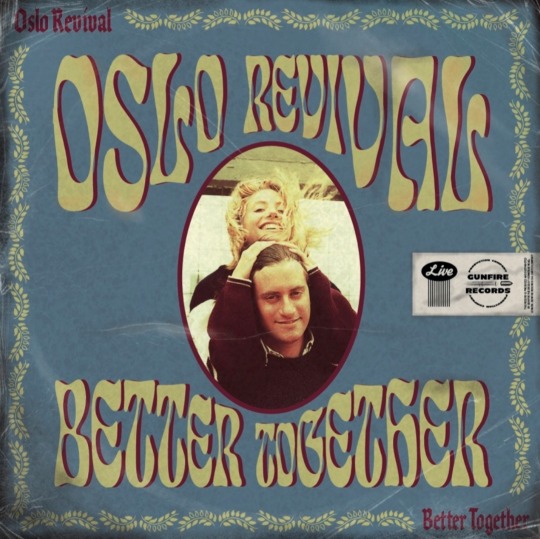
Kubasulu
1. Great White Lies (Fishy Business / Fluent in Shark-asm / Vanish into Fin-air / Gettin' Chummy / You're Gill-ty / No-fin Left to Lose / I Chews You)
2. Sweating in the City
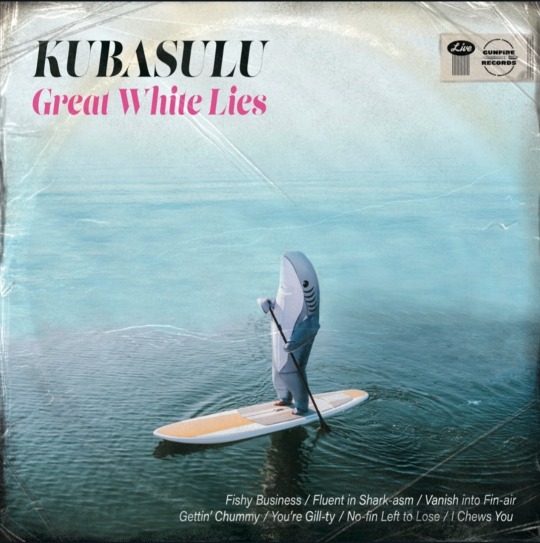

Rat Keith
1. Look at This Mountain (The Mountain I Climbed / Assorted Wailing Chants of Peril / I Ate Some Berries (Shouldn't Have Done That) / What Happens on the Mountain, Stays on the Mountain / I See It in My Dreams / Soiled Leaves and Soft Bark / Don't Touch the Mushrooms / Huddle for Warmth / My Map Blew Away / This is My Home Now / Finally Rescued)
2. A Dog in God's Hot Car
3. Chem Trails
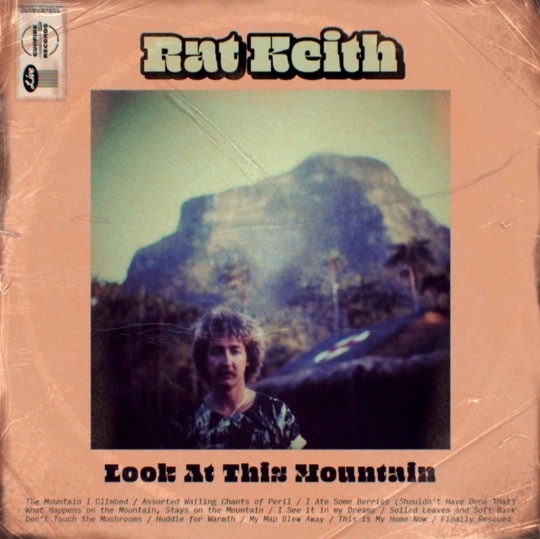
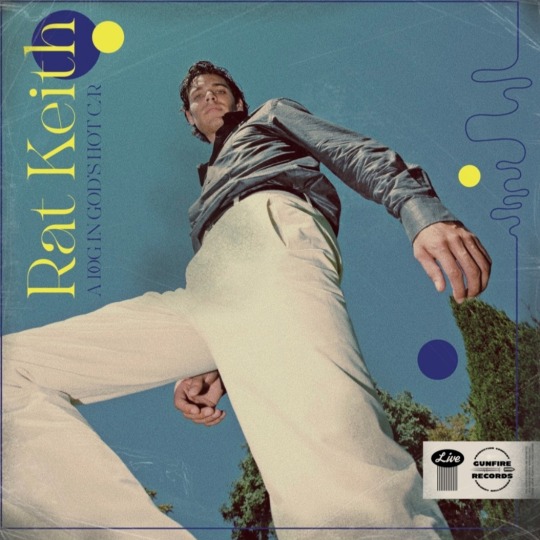
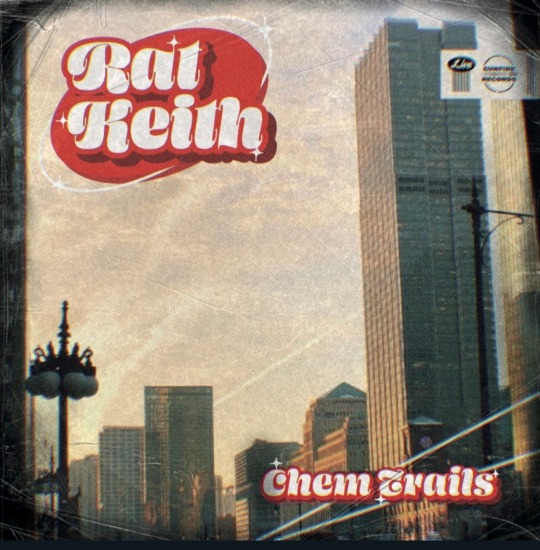
Raga Koboj
1. Raga Koboj
2. Earth, Swallow Me Whole (Why Can I Just Stay in Bed? / Sighing Loudly / No One's Going to Lunch / I'm Hungry But I Don't Want to Eat Alone / I Wonder What's on the Menu Today / Probably Something Mediocre / I'm Tired / It's Friday / I Wish It Would End)
3. Just Sounds 2.0 (Falling Coin / Stubbed Toe / Oops! / Rice in a Bowl / Spoon Clang / Gagging / Crinkled Paper / Bad Alphabet / Winded)
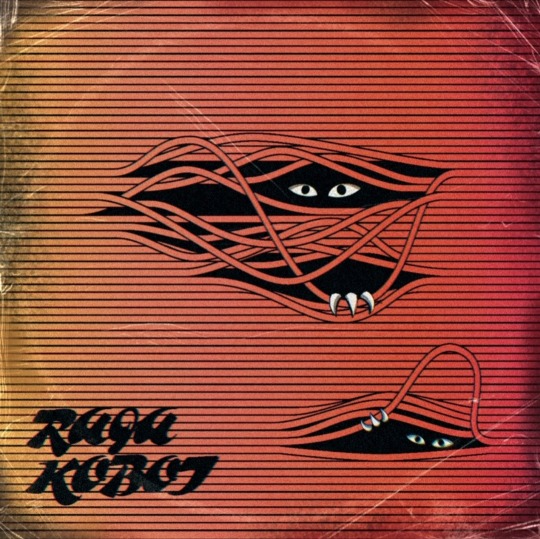
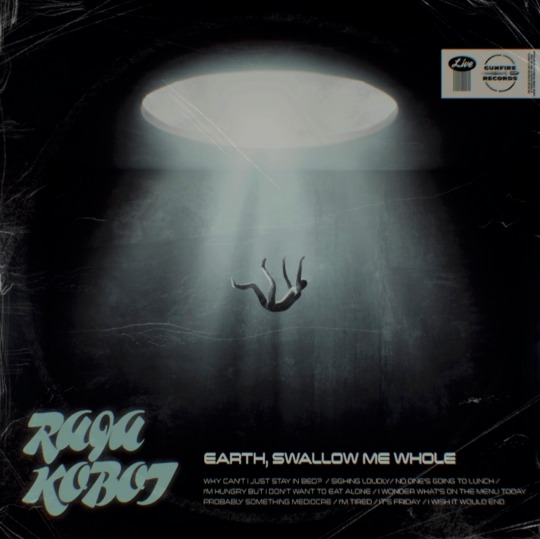
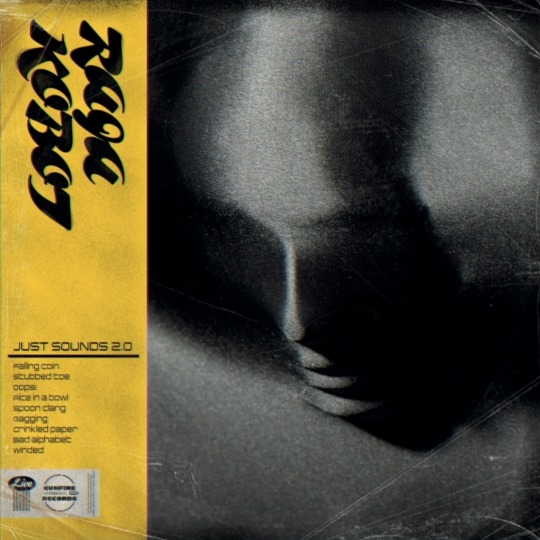
Deaf Dust
1. Change the Lightbulb (Cartwheels in Mexico / The cinnamon candle / Hold Me / Let Go / Who wait's for us? / Awesome / The basement's pretty dark / Broken Bulb / Stairway to your Mum's house)
2. Snapshots from the Moon
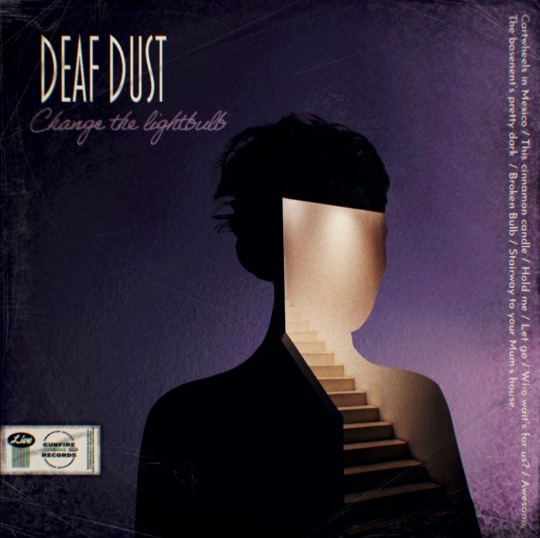
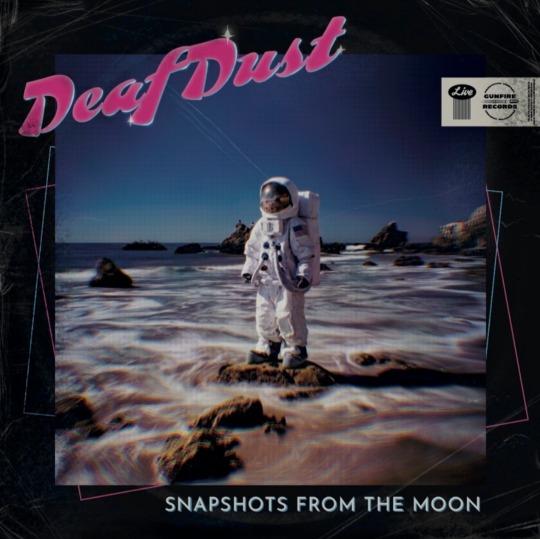
Randa Ransom
1. Doin' it in the Dust (Hard on the Rocks / Ridin' the Horizon / Tall Drink of Water / Wear My Hat / Call My Name / Let Me Use a Saddle / Just Us in the Dust)
2. I'm Lost and I Don't Speak the Language (Lost in Tokyo / WHat's that shop selling? / Sex Dolls (Self-Assembly) / Where's the Bathroom? / This Toilet is Singing / More Sex Dolls / There's a Cafe for Cats / I Want to Go Home / What's Home in Japanese? / Take Me Anywhere Taxi Man)
3. The Answer May Surprise You
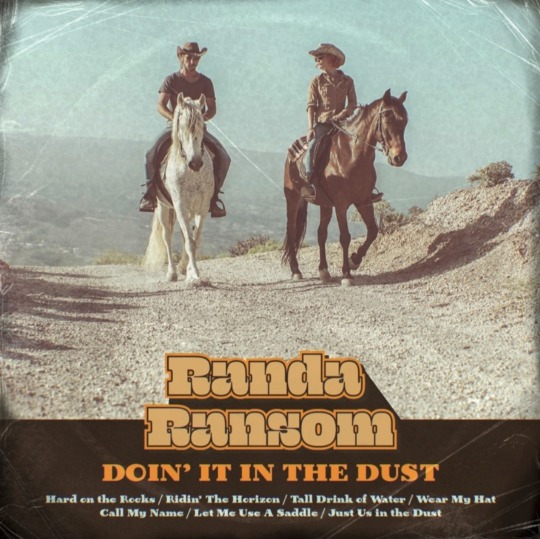
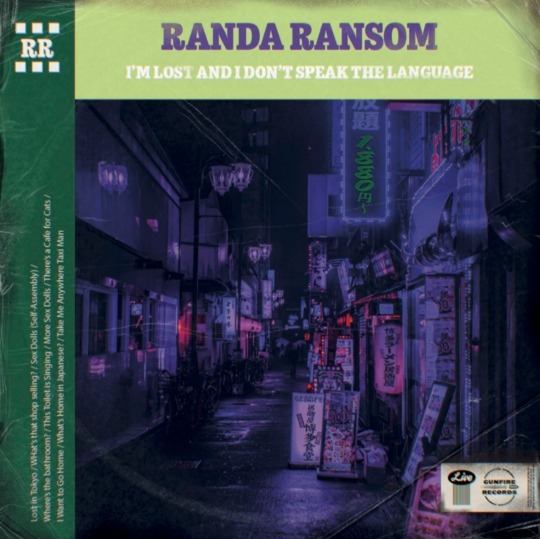
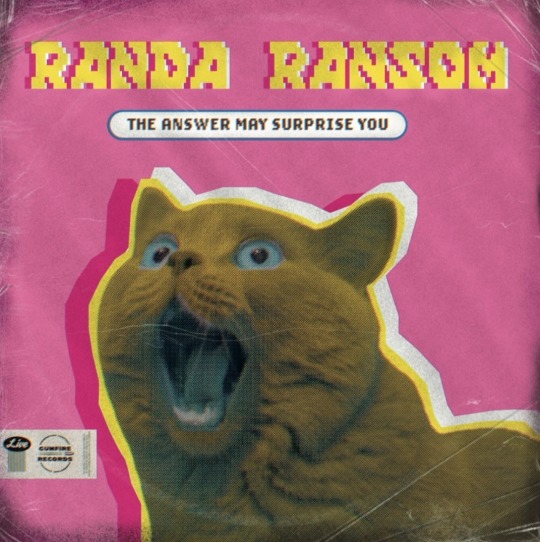
Georgina O'Georgia
1. Gorgeous in Georgia ("Oh, George You're Gorgeous" / "It's Georgia with a G!" / "Get your hands off my hair" / "Yes, that's my real name")
2. Spur of the Moment

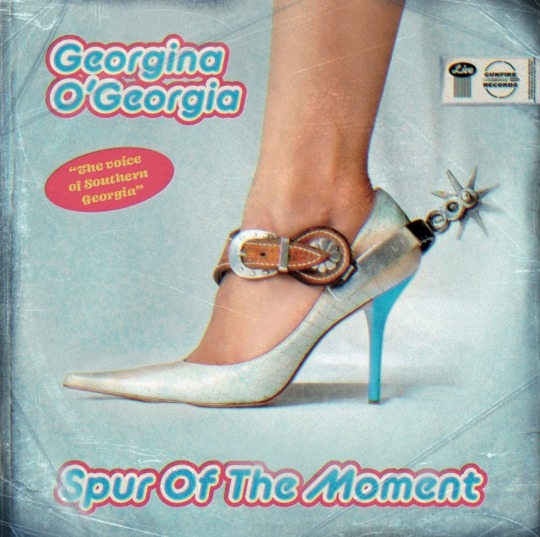
CT Bazz
1. Locking Up & Looking Down
2. Dank Balaclava
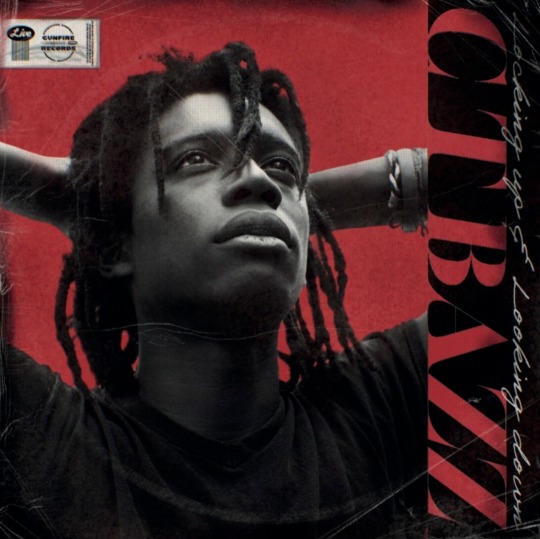
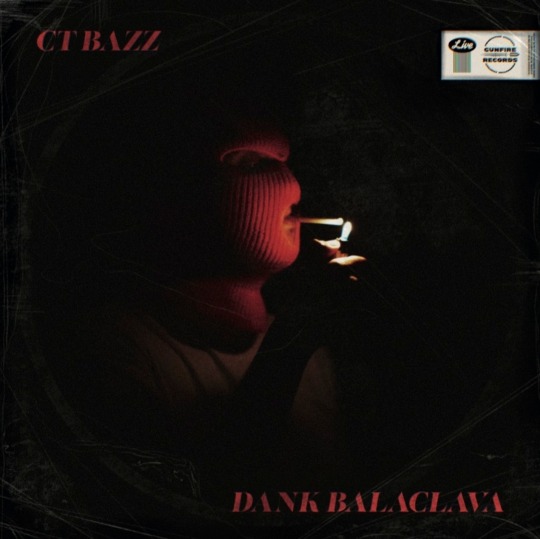
I've never seen anyone talk about these though, but they seem important. Have I missed conversation surrounding these? I'm just really curious as to what other people might think.
As I said above, there is a part two, but that part will cover artists with only one cover.
47 notes
·
View notes